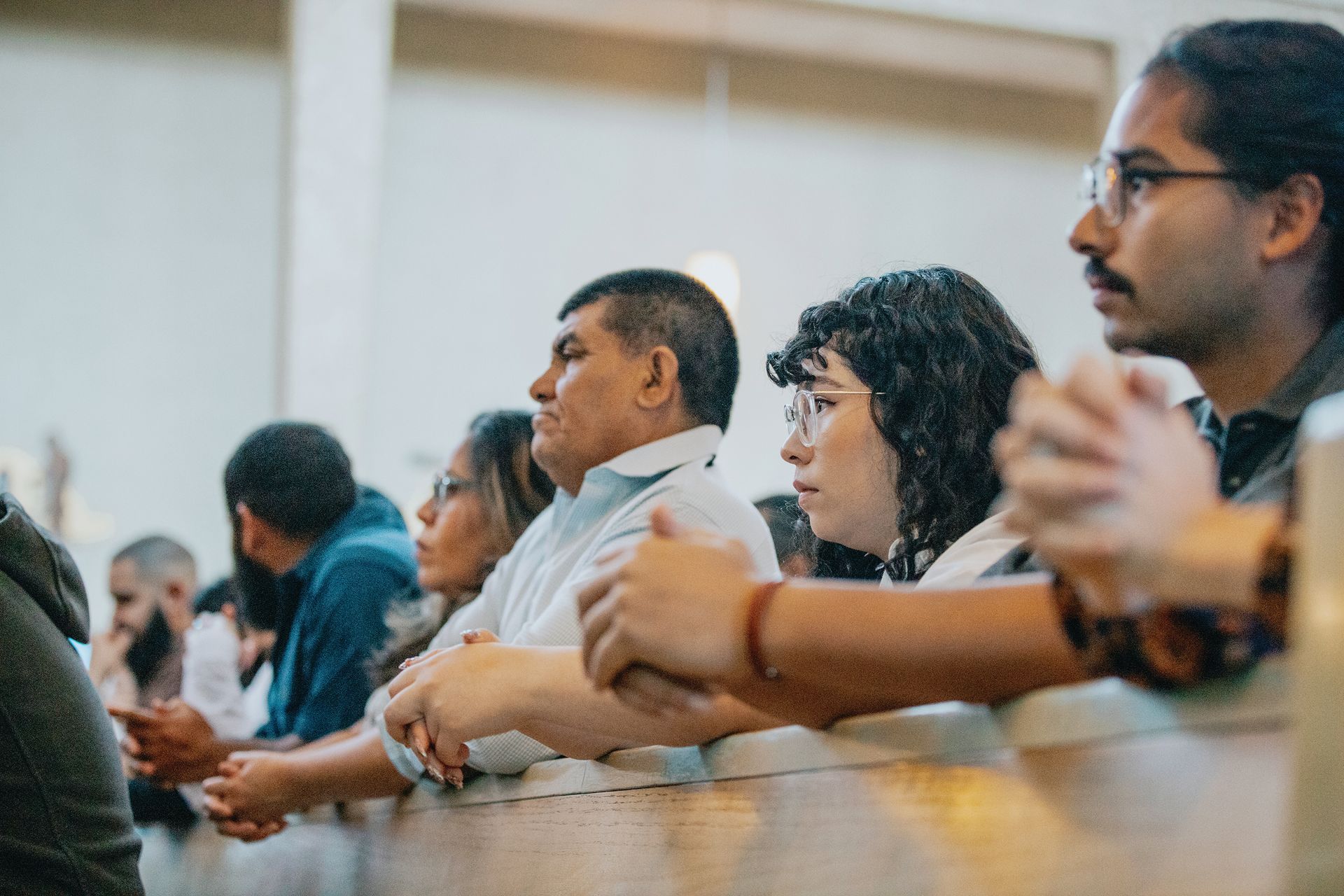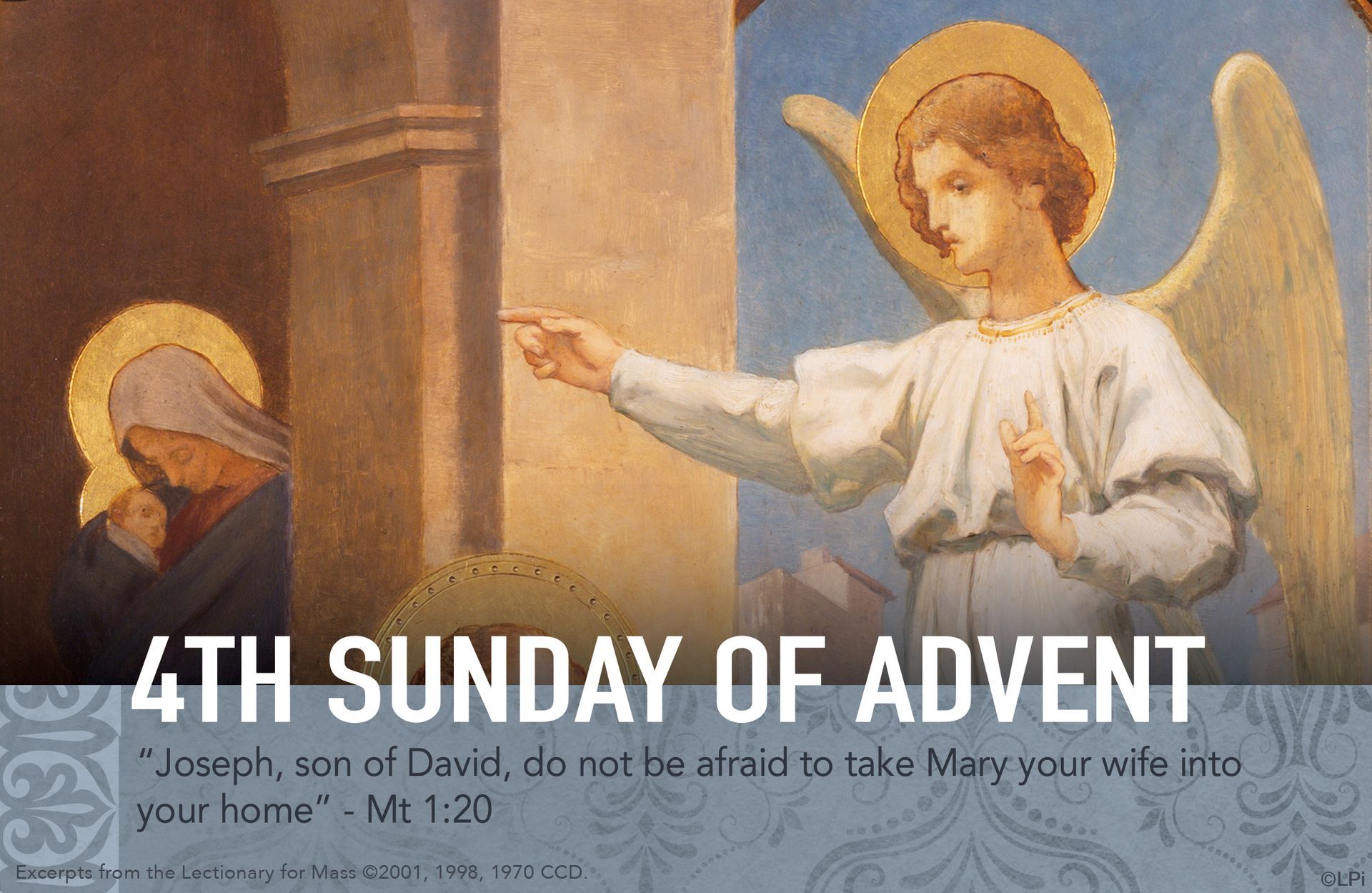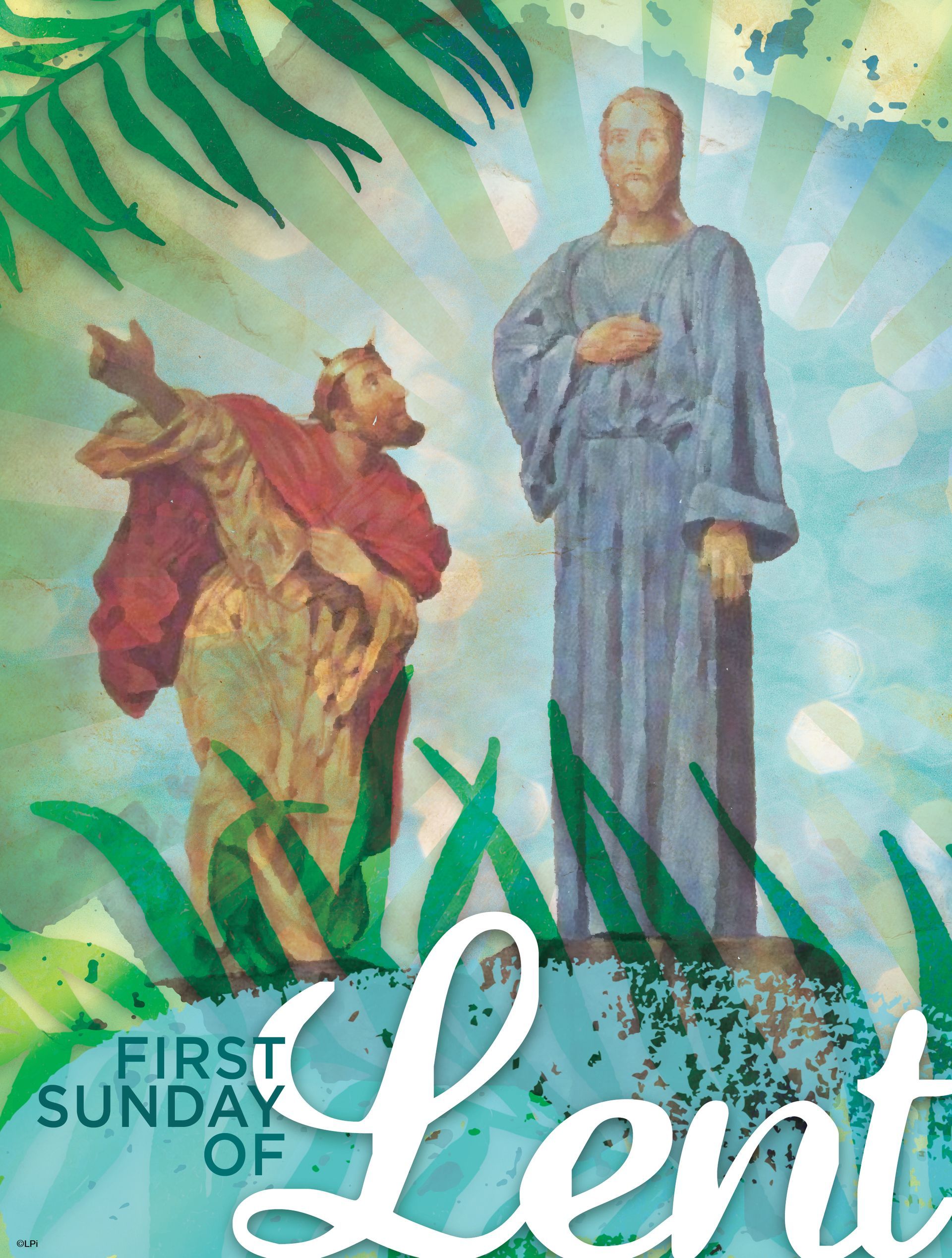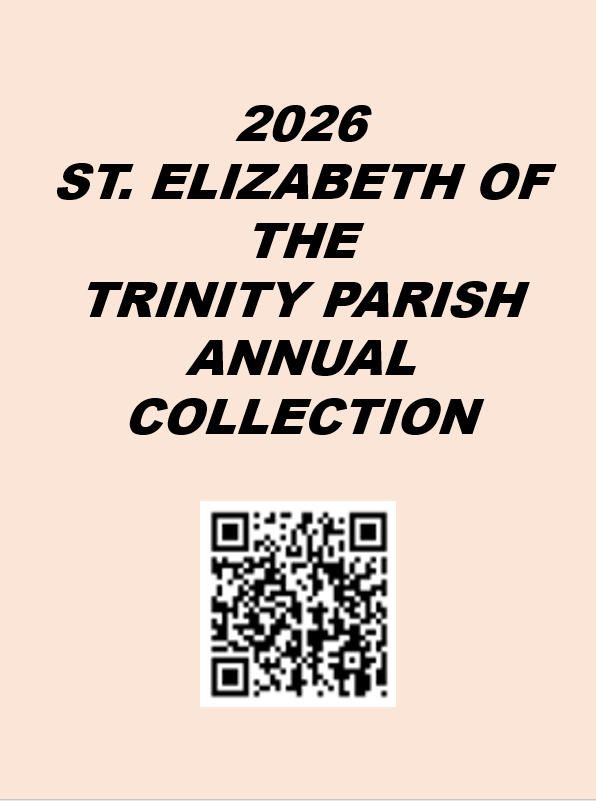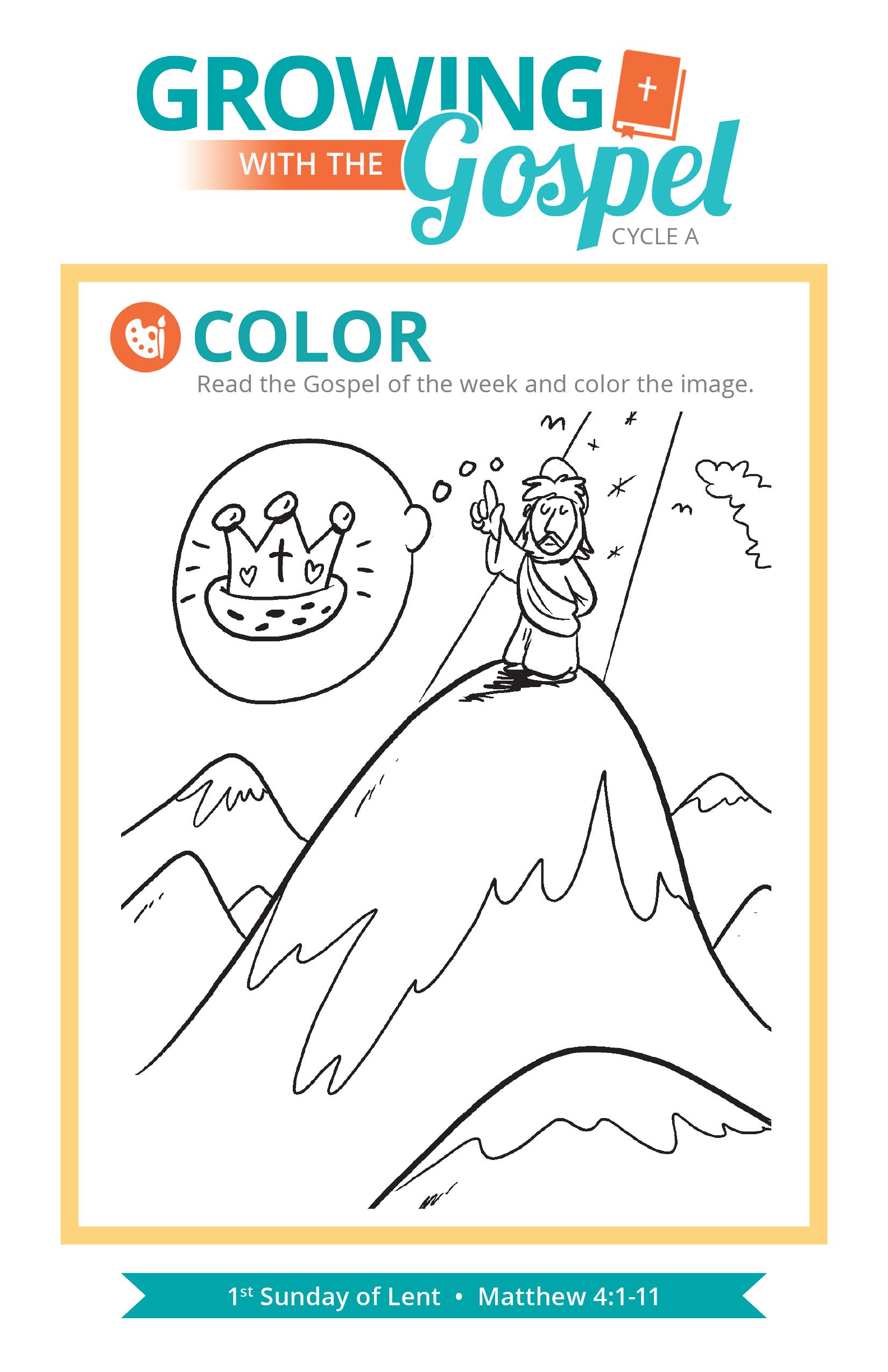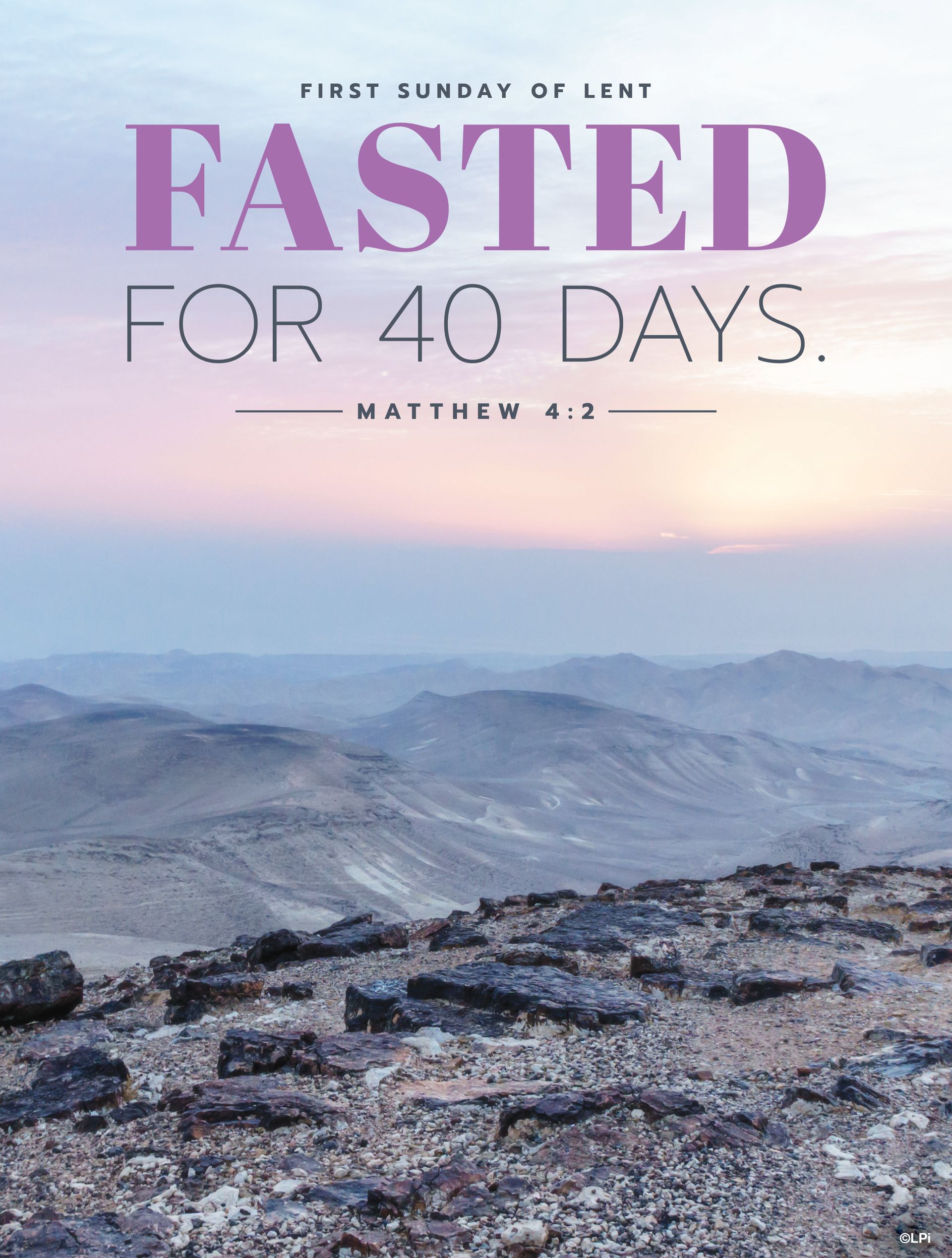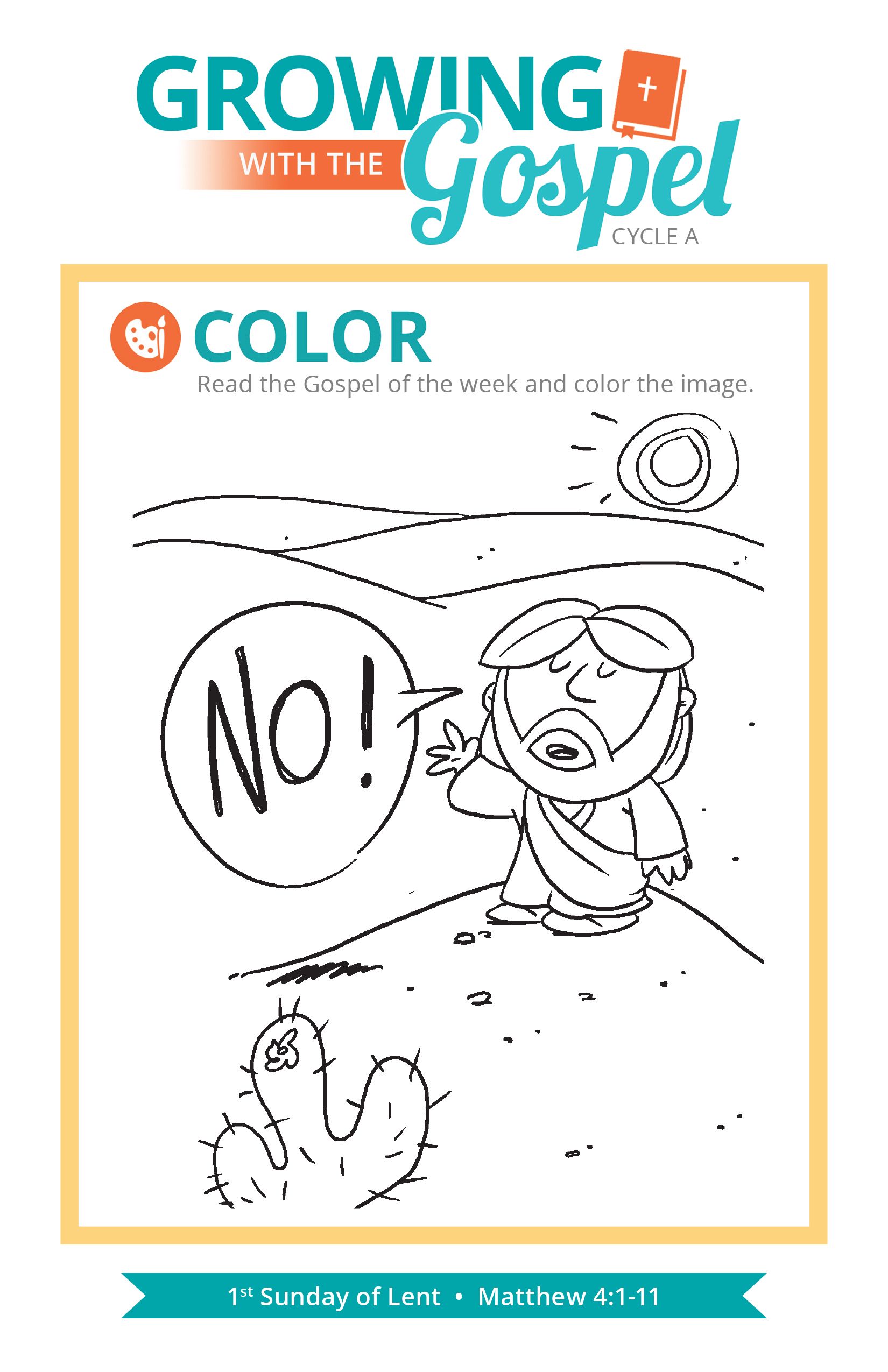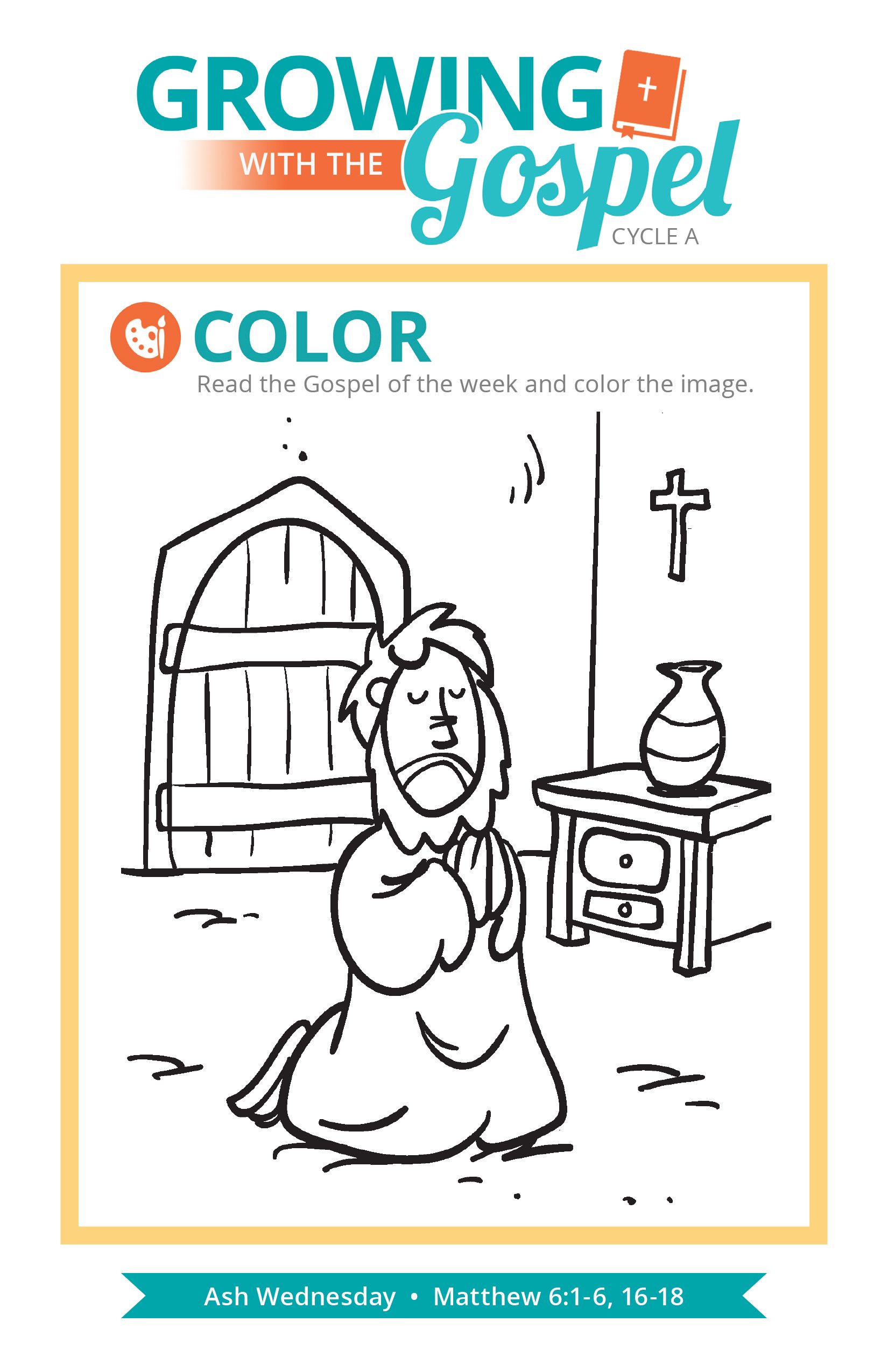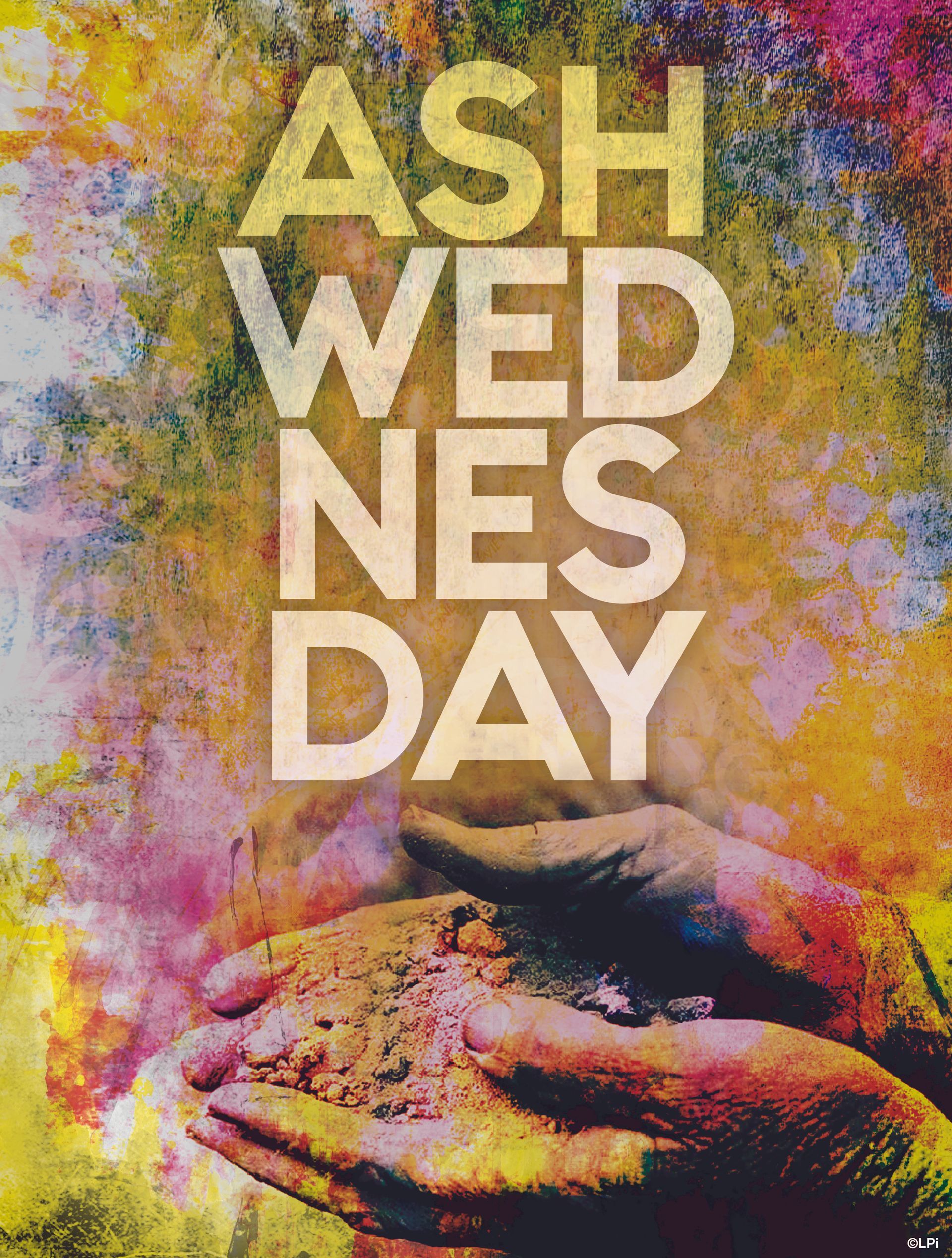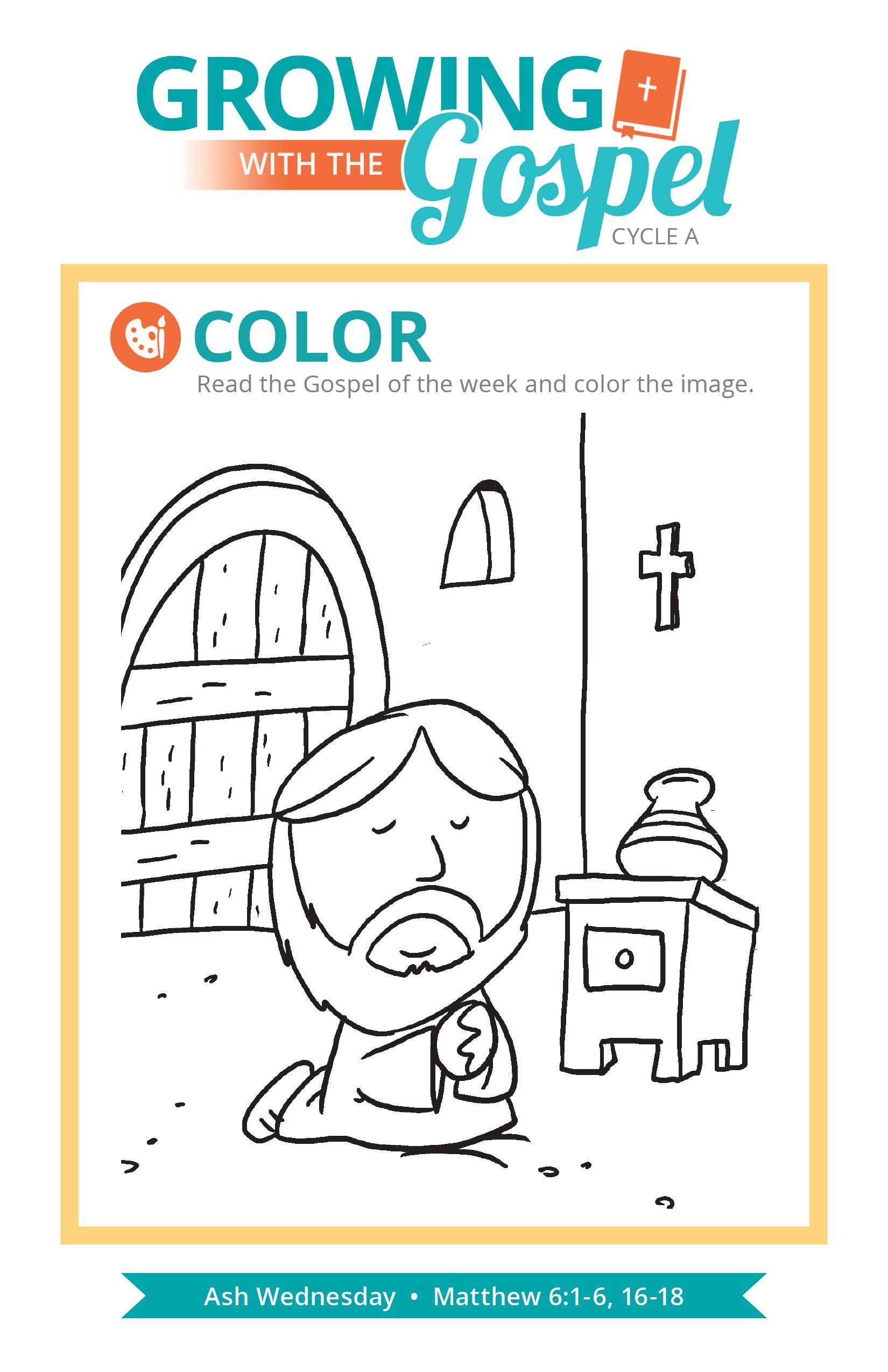Weekly Reflections
GOSPEL MEDITATION - ENCOURAGE DEEPER UNDERSTANDING OF SCRIPTURE
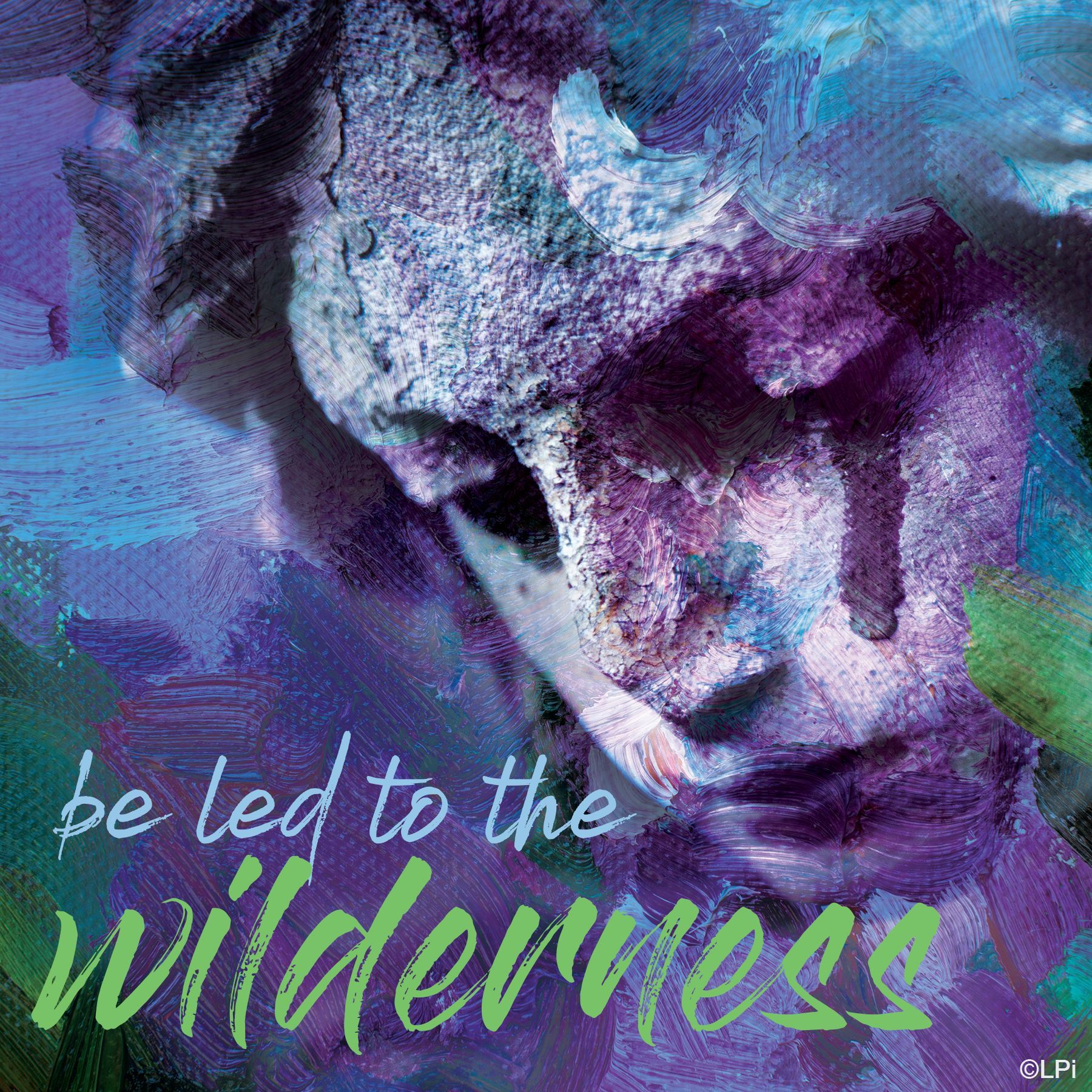
WEEKLY READINGS AND OBSERVANCES - ENGAGE PARISHIONERS IN DAILY MASS AND PRAYER
Readings for the week of February 22, 2026
Sunday: Gn 2:7-9; 3:1-7/Ps 51:3-4, 5-6, 12-13, 17/Rom 5:12-19 or 5:12, 17-19/Mt 4:1-11
Monday: Lv 19:1-2, 11-18/Ps 19:8, 9, 10, 15/Mt 25:31-46
Tuesday: Is 55:10-11/Ps 34:4-5, 6-7, 16-17, 18-19/Mt 6:7-15
Wednesday: Jon 3:1-10/Ps 51:3-4, 12-13, 18-19/Lk 11:29-32
Thursday: Est C:12, 14-16, 23-25/Ps 138:1-2ab, 2cde-3, 7c-8/Mt 7:7-12
Friday: Ez 18:21-28/Ps 130:1-2, 3-4, 5-7a, 7bc-8/Mt 5:20-26
Saturday: Dt 26:16-19/Ps 119:1-2, 4-5, 7-8/Mt 5:43-48
Next Sunday: Gn 12:1-4a/Ps 33:4-5, 18-19, 20, 22/2 Tm 1:8b-10/Mt 17:1-9
Observances for the week of February 22, 2026
Sunday: 1st Sunday of Lent
The Feast of the Chair of St. Peter
Monday: St. Polycarp, Bishop and Martyr
Tuesday: Blessed Luke Belludi
Wednesday: Blessed Sebastian of Aparicio
Thursday: Saint Maria Bertilla Boscardin
Friday: St. Gregory of Narek, Abbot and Doctor of the Church
Saturday:
Next Sunday: 2nd Sunday of Lent
Observances for the week of February 15, 2026
Sunday: 6th Sunday in Ordinary Time
Monday: St. Juliana, Presidents’ Day
Tuesday: The Seven Holy Founders of the Servite Order
Wednesday: Ash Wednesday, and Blessed John of Fiesole
Thursday: St. Conrad of Piacenza
Friday: St. Leo of Catalina, Pope
Saturday: St. Peter Damian, Bishop and Doctor of the Church
Next Sunday: 1st Sunday of Lent
February 22, 2026
1st Sunday of Lent
Matthew 4:1-11
In my second-to-last year of seminary, I woke up one September morning to devastating news: two beloved classmates had died in a car crash. I was overwhelmed with grief and anger like I had never known. I entered therapy for the first time and had intense conversations with my spiritual director. For months I felt lost in a spiritual wilderness. But something unexpected happened: I encountered Christ there. The fear and sorrow didn’t destroy me. In fact, that spiritual desert was a time of intense growth in faith.
Today’s Gospel begins: “Then Jesus was led by the Spirit into the desert to be tempted by the devil” (Matthew 4:1). The word “led” denotes a gentle, humble submission to the Spirit. Jesus does not send himself into this desolate place where wild beasts roam and Satan tempts. Who wants to be around roaming, wild beasts? The Church Fathers saw them as symbols of our inner chaos: fears, temptations, wounds. The Spirit leads us there, sometimes against our wishes. But those same Fathers also saw that this deserted place is also where angels ministered to Jesus, amidst his great trial and temptation.
Lenten Challenge: This Lent and throughout life’s struggles, the Spirit leads you and me into the wilderness. Name one “desert” into which the Spirit has led you: perhaps grief, fear, silence, change, disappointment. Ask for the grace to go there willingly. The beasts may be real, but they will not harm you. There, the angels are waiting to minister to the Christ living in you, who always goes where the Spirit leads.
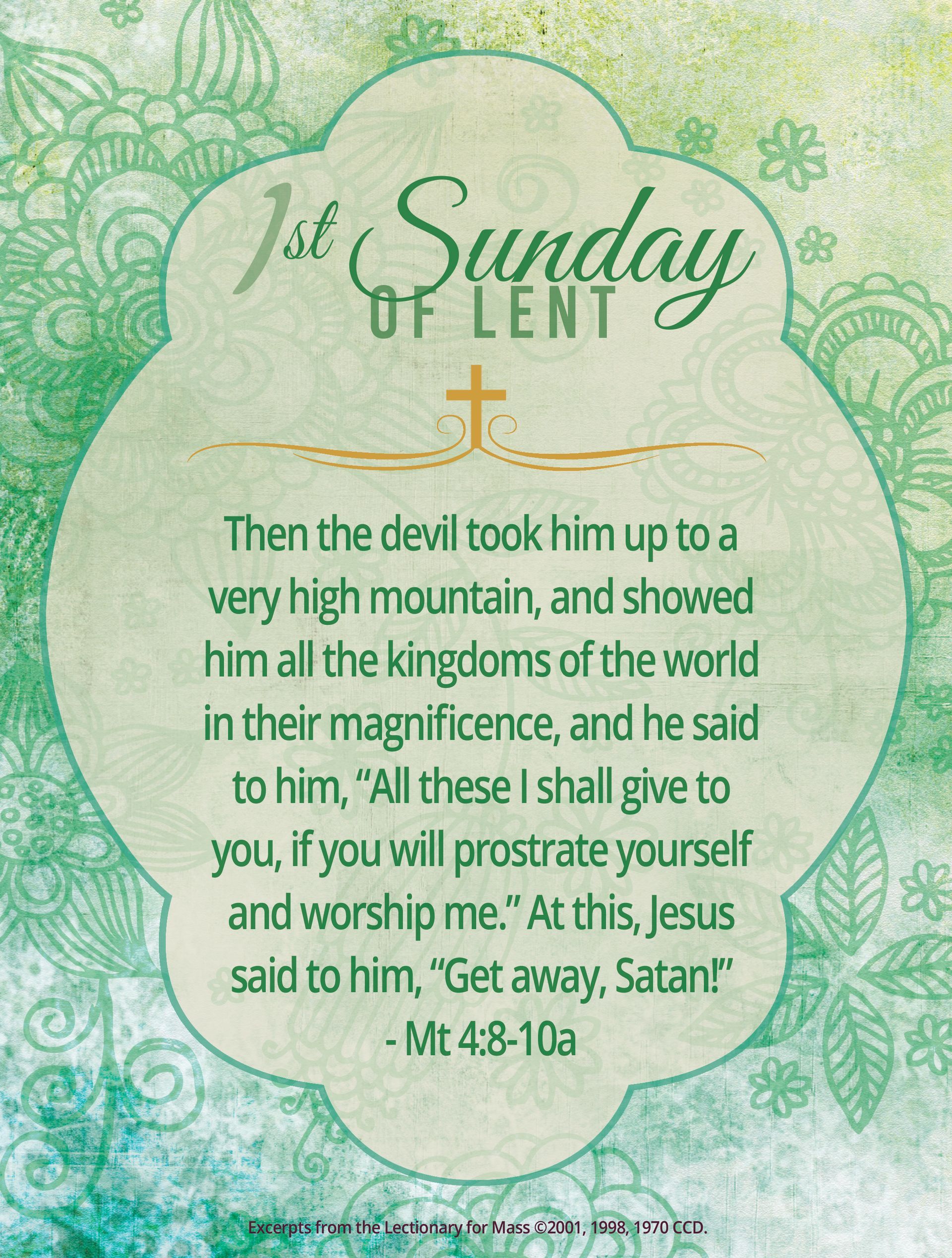
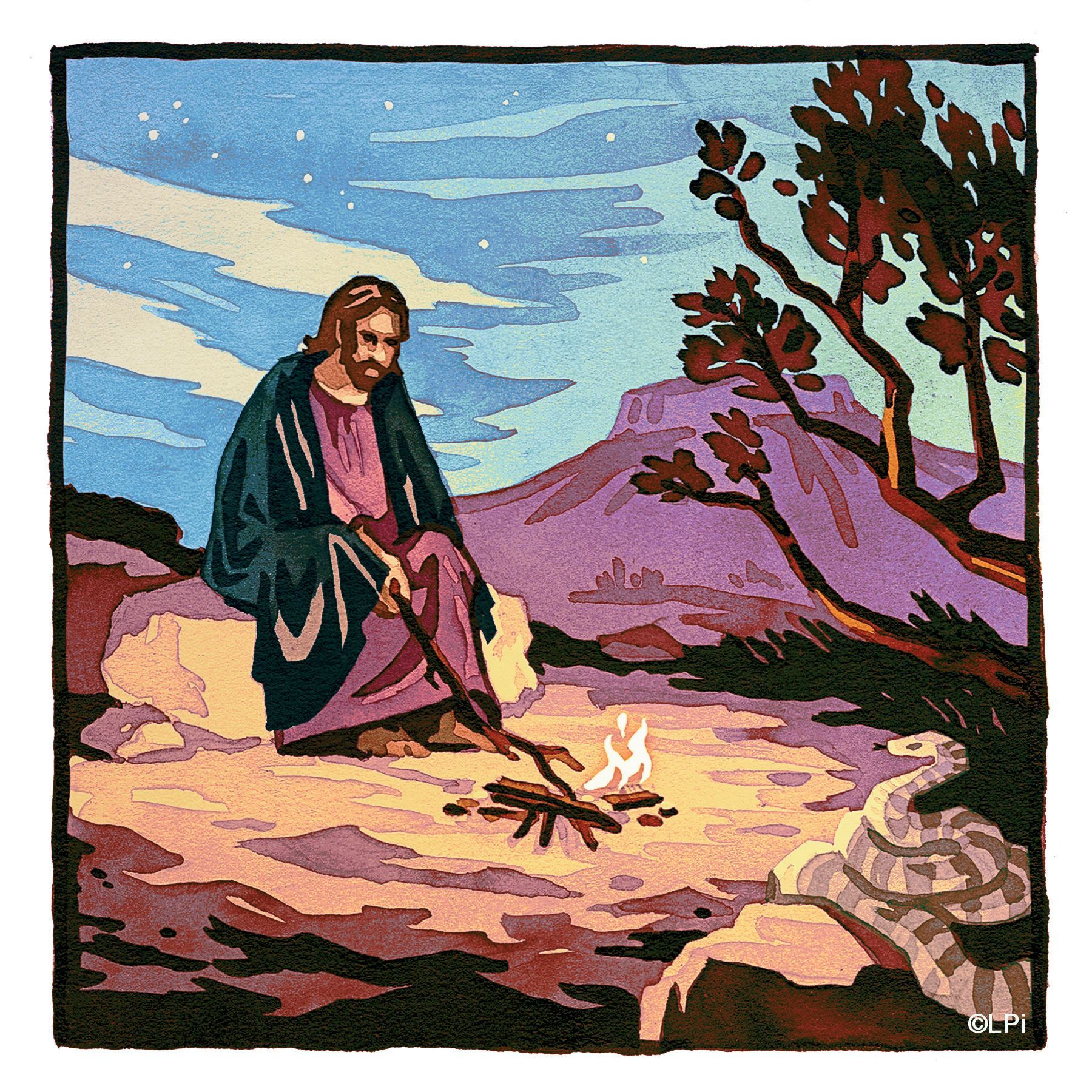
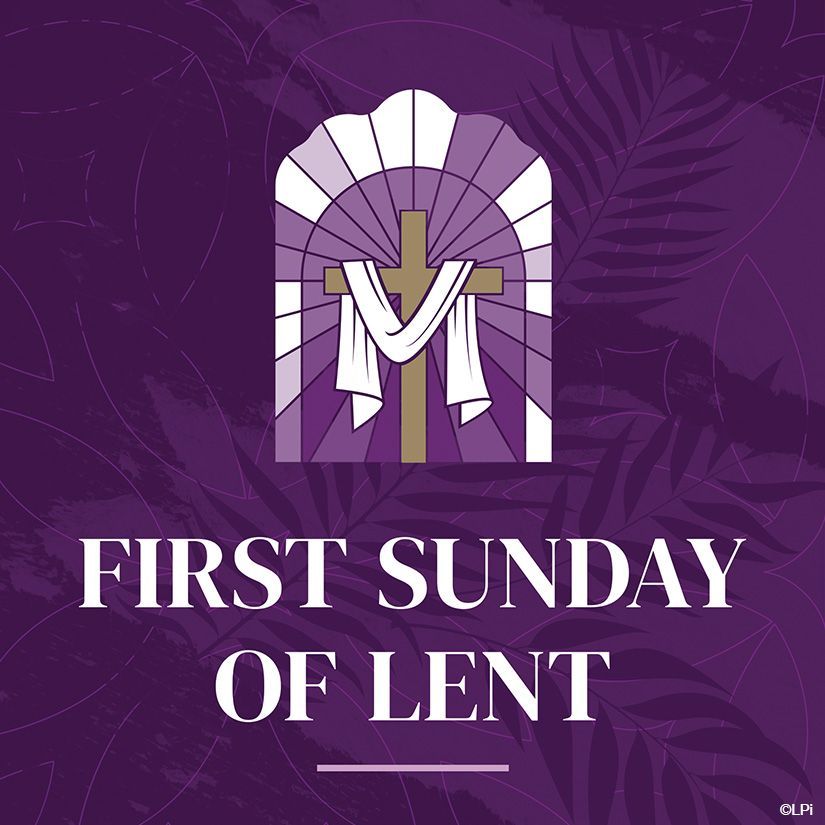
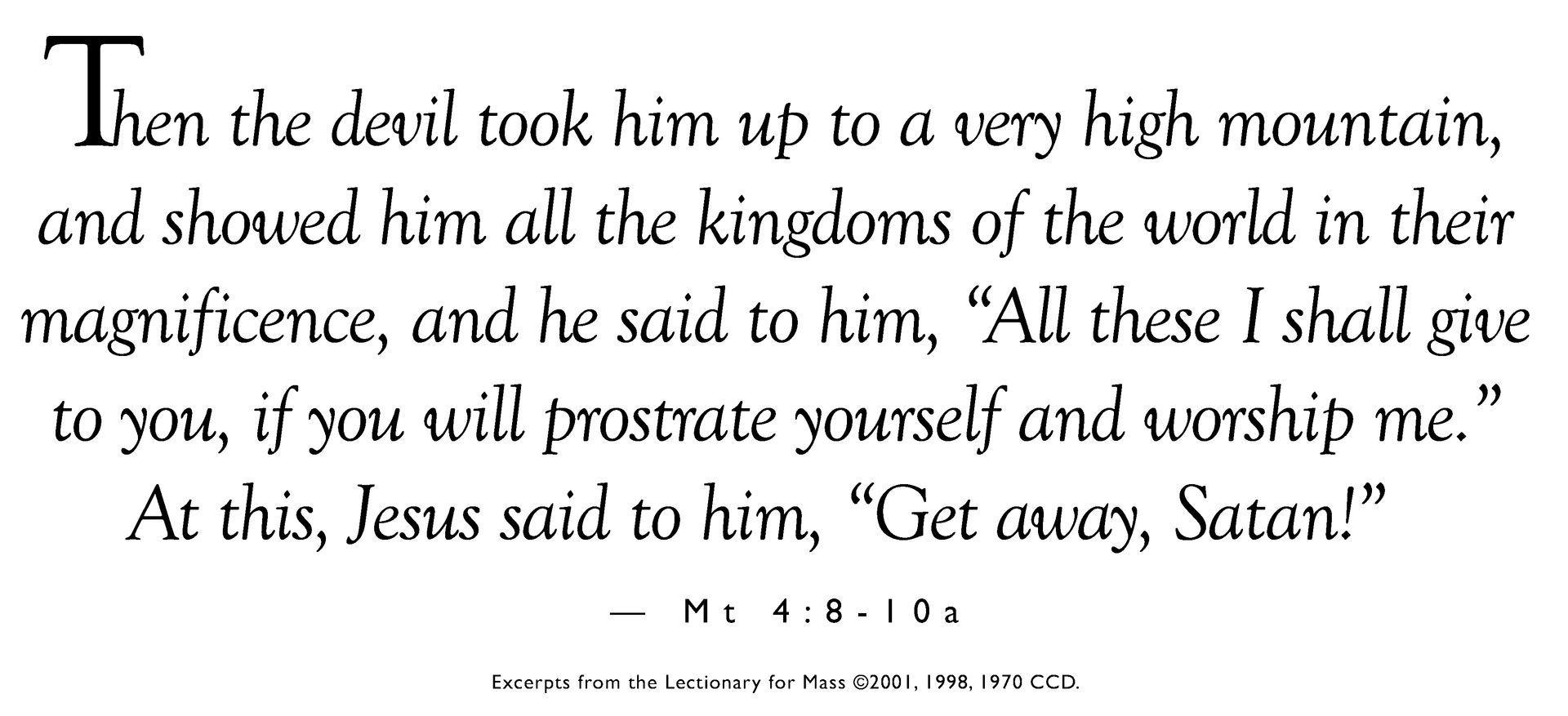
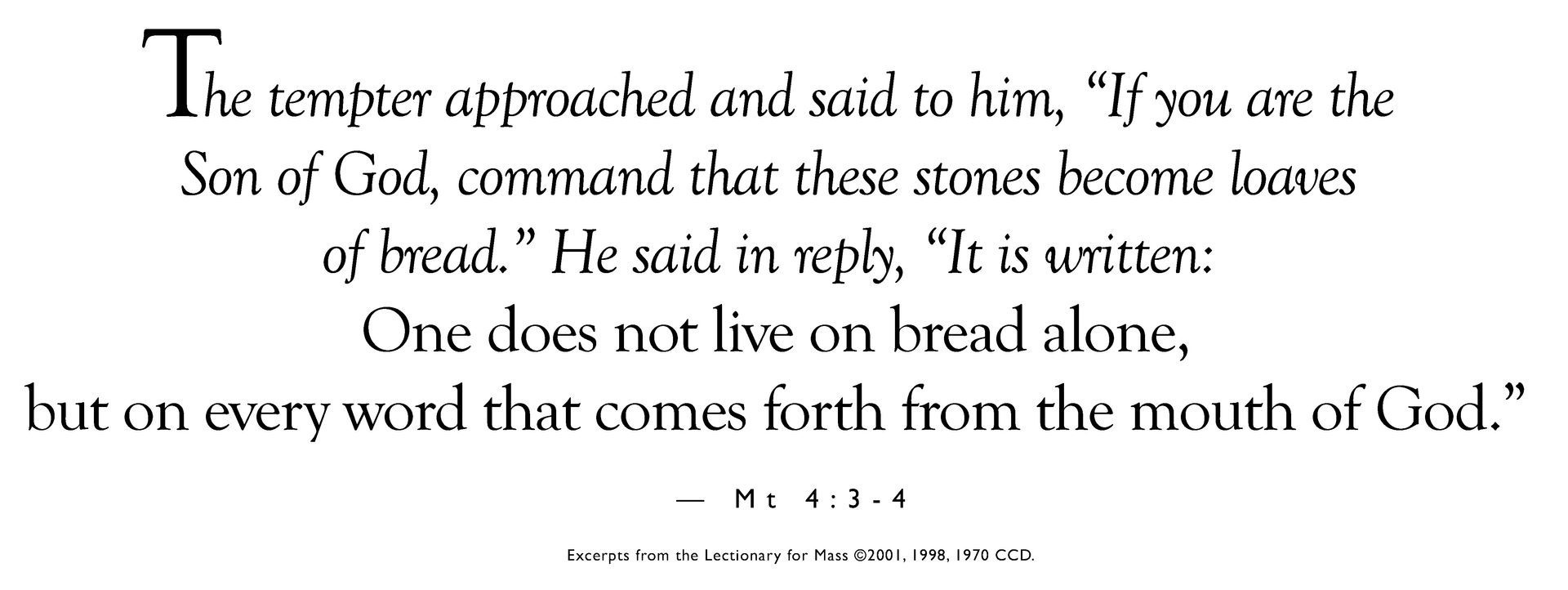
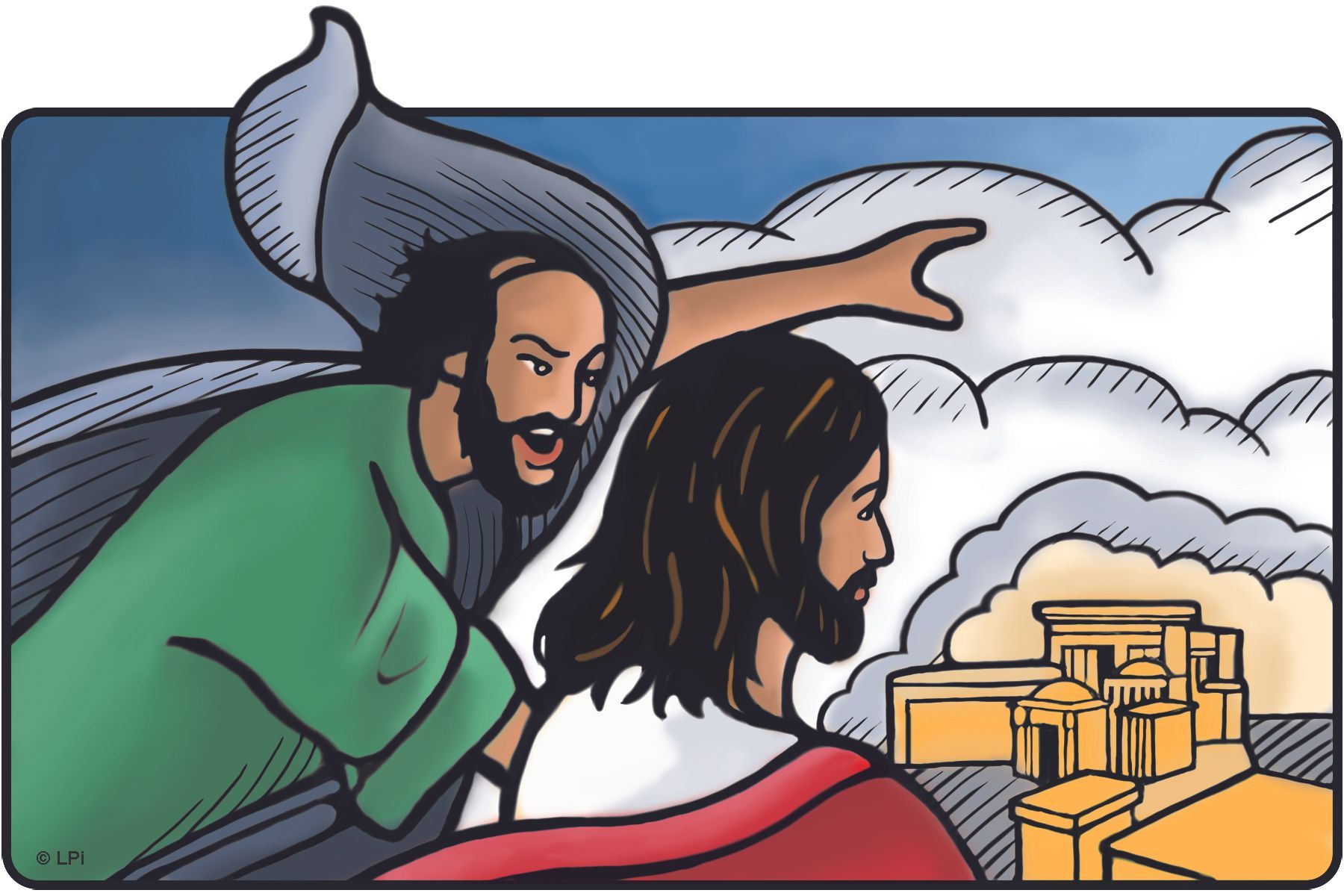
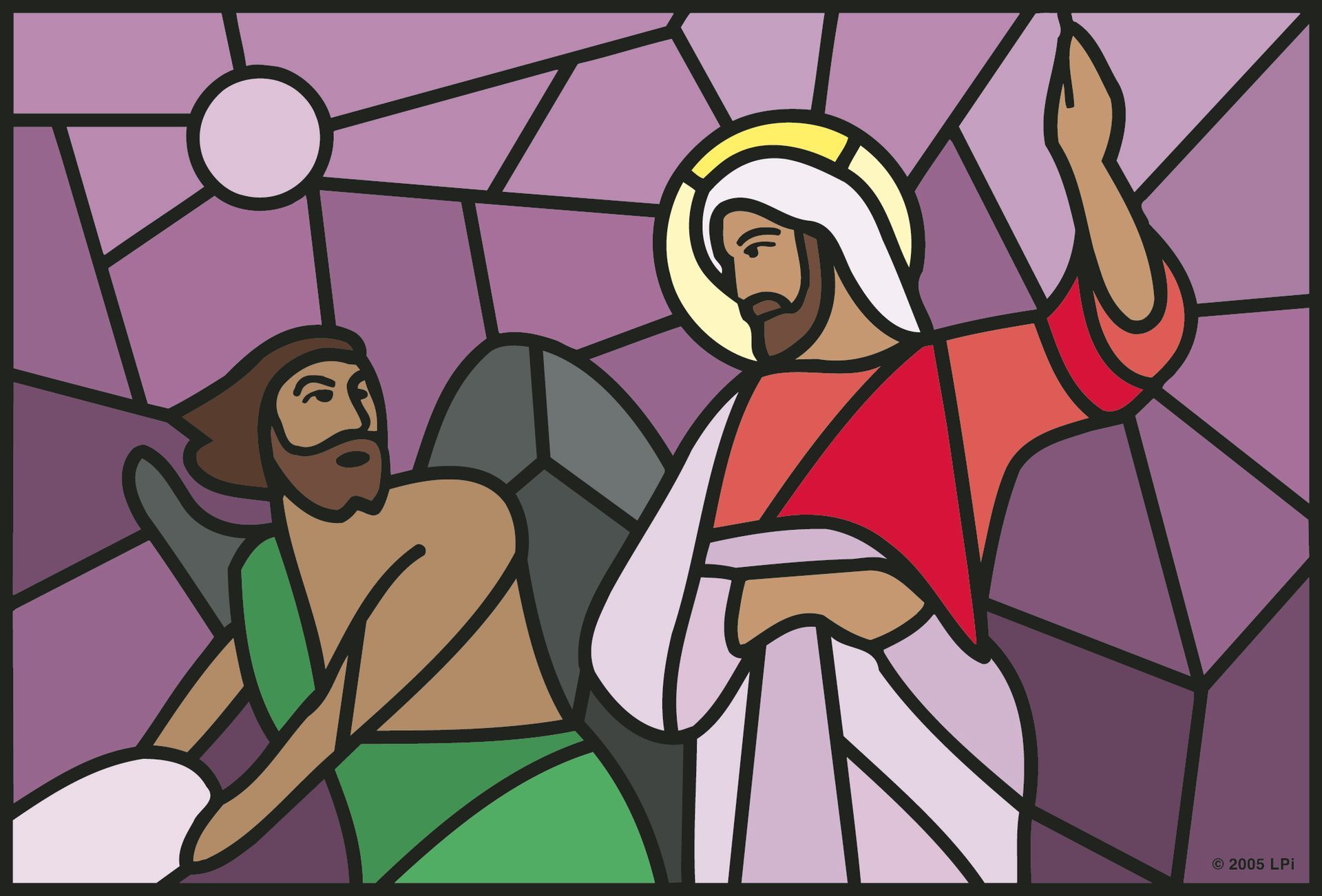
1st Sunday of Lent / February 22, 2026
SUNDAY'S READINGS
First Reading:
The LORD God formed man out of the clay of the ground
and blew into his nostrils the breath of life. (Gn 2:7)
Psalm:
Be merciful, O Lord, for we have sinned. (Ps 51)
Second Reading:
For just as through the disobedience of the one man the many were made sinners, so, through the obedience of the one, the many will be made righteous. (Rom 5:19)
Gospel:
At that time Jesus was led by the Spirit into the desert to be tempted by the devil.
He fasted for forty days and forty nights. (Mt 4:1-2)

QUESTIONS OF THE WEEK - INVITE PARISHIONERS TO REFLECT AND RESPOND TO SCRIPTURE
1st Reading Question
Sirach speaks of the human freedom to choose between good and evil and of God’s desire for us to act justly. What good could you do this week for a friend or family member?
2nd Reading Question
Paul teaches that God reveals His wisdom to us through the Holy Spirit. How might you be more open to listening to the Holy Spirit in your daily life?
Gospel Question
Jesus offers stern warnings against breaking the commandments, holding grudges, committing adultery, divorcing your spouse, and falsifying oaths. Why do you think Jesus holds us to such high moral expectations?
LIVE THE LITURGY - INSPIRATION FOR THE WEEK
(PRACTICING) CATHOLIC - RECOGNIZE GOD IN YOUR ORDINARY MOMENTS
Mini reflection: There are many reasons why the Word became flesh. But I think one of the most important reasons must have been that God wanted to show us that He knows, intimately, how easily the devil exploits our physical experience of this world.
Thirteen years later, I still want to know it all. But I want to know it after he’s had a snack.
It’s not impossible, of course. It’s just … hard.
Because Christ has shown us that the desert is where decisions are made.
We see him. We recognize him. We are him.
And we hear his voice, even though it trembles with fatigue: “Get away, Satan!”
Today, we enter the desert. Because the desert is where decisions are made.
EVERYDAY STEWARDSHIP - RECOGNIZE GOD IN YOUR ORDINARY MOMENTS
1st Sunday of Lent
Today we start the path of forty days to Easter. We are in the season of Lent. Our readings today speak about the desert experience of Jesus. Moreover, in order to understand the analogy of "desert" we need to know the origins of sin and death.
Sin is described in Scripture as the desire for the "forbidden fruit." We are made in the image of God and God desires only good for his creation. When we desire that which is not good for us, we term that sin. And when we desire so much that we lose sight of God, we die to the idea of goodness.
Jesus is tempted by the devil to turn away from God and to desire the earthly pleasures of wealth and power. Jesus is God and so is able to turn away from that temptation; we are not God, however, and oftentimes we give in to that desire and therefore sin against the goodness of God.
Through these forty days of Lent, let us look closely at our lives to see where we need to be more faithful to that which is good in our lives and concentrate on how to increase the goodness that God has put in our hearts.
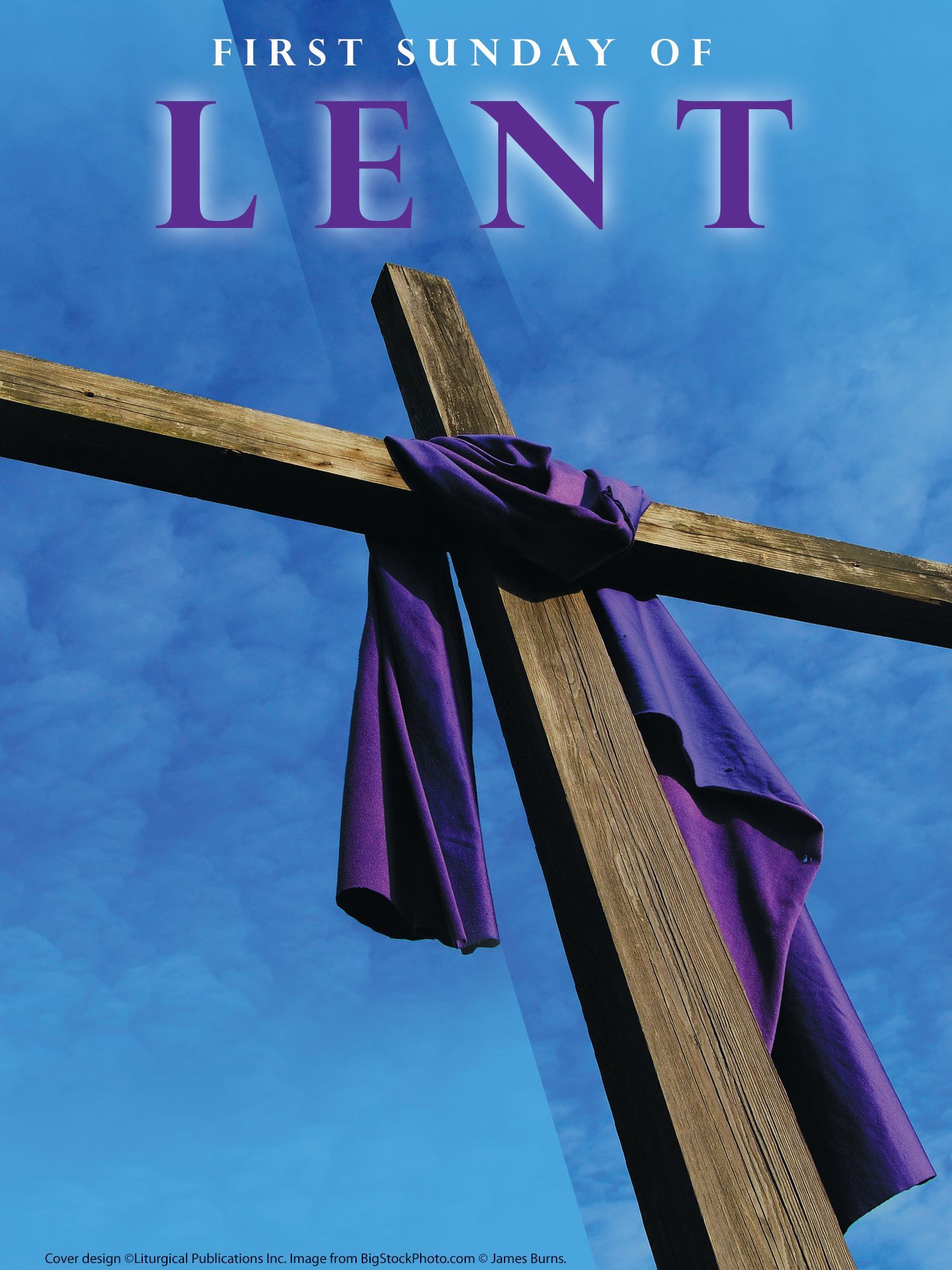
Can you believe Lent is here already? It seems like not that long ago I was decorating a Christmas tree! Time waits for no one and that is why it is important to make a mindful commitment now to not let this Lenten season pass you by. It is a great time to focus on growing as an everyday steward. The temptations are always there to procrastinate or to give in to spiritual laziness, but the Church's observation of Lent offers us so many tools to help us get on track. Increased devotions such as Stations of the Cross, various parish missions, or Lenten-focused literature are all gifts that your parish may be offering to assist you in this season.
With the Passion being the focus of Lent, it is easy to contemplate the value of true generosity. How could someone give more than Jesus? He gave until his life was spent on a cross. When contemplating how we can increase our generosity in all aspects of our life, we only need to look to the cross. Of course, this also brings home to us that more may be asked of us than we bargained. The temptation is to not give too much, out of fear that we might face persecution or worse.
But we take solace in the fact that we are disciples of One who had the same temptations. He overcame those temptations. He rejected the easy way out. His love and generosity could not be contained. He gave it all so that you and I have the chance to do the same. This Lent, look to the greatest example of stewardship that ever lived. Jesus will show us the way to observe a Lent that will soon bring forth great Easter fruit.
The 6 Characteristics of an Everyday Stewardship for Lent – Mindful
What is it that tempts you the most? Is it an action, a person, or a place? It is something that seems innocent enough, like a food, a drink, or an event? When you really start reflecting, you find that there are many temptations all around. Even if you are strong and never succumb to a certain temptation, it is still there waiting for a weak moment in your life.
One difficultly in the life of a disciple trying to live a stewardship way of life lies in the temptations we never actually see. We are too busy thinking about past failures or successes, or we are fixated on what possibilities the future holds that we miss the important things going on in the present. Jesus could be standing directly in front of us, but we miss him because we are looking everywhere except straight ahead.
Being mindful means that we are looking out for how and when God will call us this very day. Our decisions this day will have a huge impact on the future. If we only look to the future, we will miss those important calls to action. We may even find ourselves in a desert of sorts, looking for any way out we can find. However, God may need us to give of ourselves for a reason we cannot yet discern while in that desert. We need to stay awake, be aware, and look for His hand in all things. If we don’t, we may even miss the pathway out of that desert when it presents itself
First Sunday of Lent
A covenant is a formal agreement between two parties. Assuming both parties enter into the covenant of their own free will, it is a bond that cannot be broken. As time goes on, that covenant will be tested and its validity questioned by skeptics, but it will remain if it is real.
God's covenant with his people is real. It began with a promise made to Noah and was renewed in the person of Jesus Christ. It has been tested by man through sin and by evil through Jesus' trials in the desert. But here in 2015, it still remains as strong as ever.
This Lent, take time to rediscover and reflect on this covenant God has with us. Reclaim your baptism and make it a motivating factor in how you live your life. Take the opportunity this Lenten season provides to increase your devotion and spirituality. You will be tested and you will suffer trials, for life is not always easy. But God has always upheld his part of the agreement. Now is the time to take our part in this covenant more seriously.
GIVE ONLINE TO ST. ELIZABETH OF THE TRINITY PARISH
Please Note: For Online giving we are now using
OSV(Our Sunday Visitor).
If you need to go to Parish Soft
to close your account please use the button below
Why Do We Do That?
Catholic Life Explained.
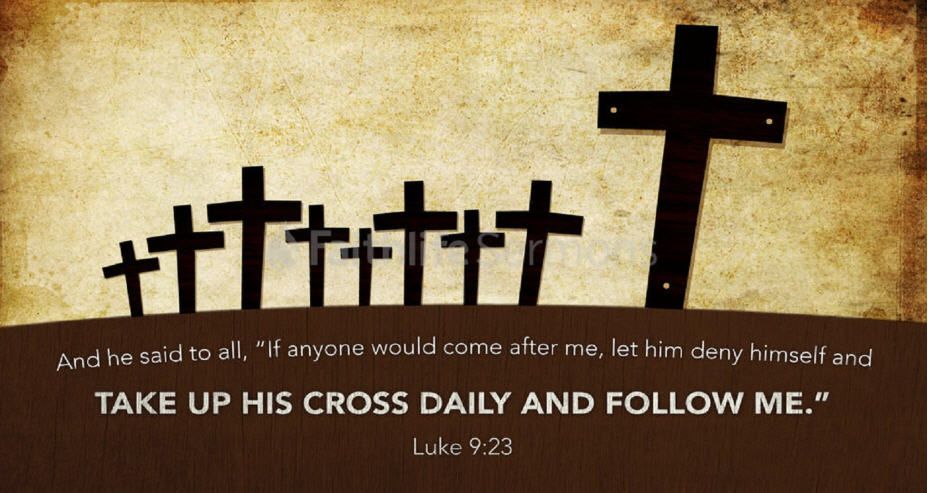
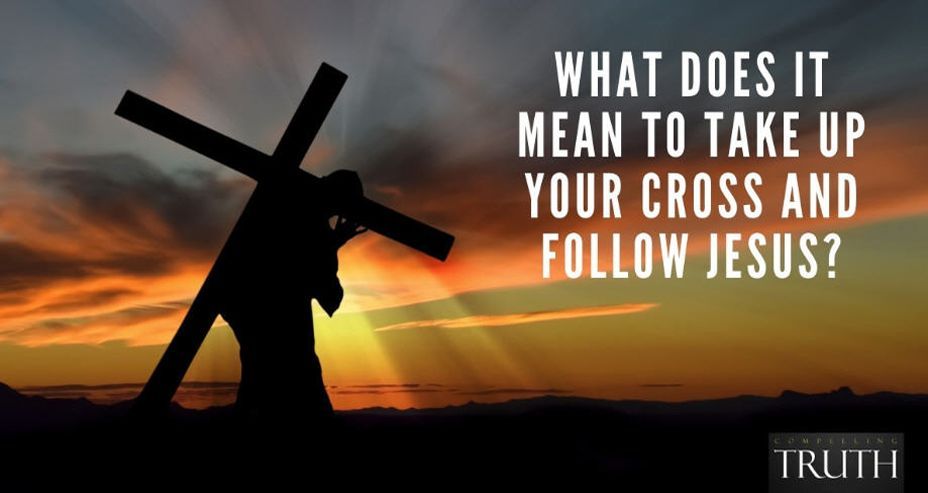
Take Up Our Cross
Question:
What does Jesus mean when he talks about taking up our cross?
Answer:
Our journey of faith begins in baptism. When we are faithful to it, we find God’s plan for us, his way of allowing us to participate in his saving work, which in turn becomes for us our own salvation. Stated simply, we share in the mission of Jesus each day. We live our life with all of its ups, downs, joys, and sorrows in union with the mission of Jesus. Our work then is holy. It is joined to the cross, God’s will for Jesus — the way in which he destroys sin and death and makes eternal life possible. His sacrifice accomplishes what we ourselves cannot do.
To take up the cross, then, means that we share in the mission of Jesus and so embrace the sufferings of the cross. It is our daily life made holy, given a redemptive mission. It is our purpose and goal to unite our life to that of Christ. St. Paul says it best, “If we have grown into union with him through a death like his, we shall also be united with him in the resurrection”

Lenten Blessing
Bless us in Your mercy, Lord, as we enter these 40 Days of Lent.
Use this time to call, anoint, bind, strengthen, and inspire us anew.
Like a good shepherd, teach us Your voice, and give us the strength to follow.
Amen.
Blessing of Love
Heavenly Father,
Ignite us with Your love.
Reveal to us Your will,
guide us in Your path.
Pour Your blessings upon us,
You who are the giver of every good thing.
Help us to live, work, act, and speak
in ways that bring honor and glory to You.
Amen.
Blessing of Mission
Bless us on our way, O Lord. Share with us as we share with others.
Heal us as we help others to heal. Provide for us as we open our hands in charity.
Every gift comes from You. You are at the heart of all that is good.
Share that goodness with us today, abundantly.
Amen.
Bless Us, Lord
Jesus,
You are good and gracious, every moment of every day. You invite us to be meek, merciful, clean of heart, peacemakers. Give us the grace to seek these virtues, and to seek you. May your blessing accompany us on our way.
Amen.
Blessing of Light
Where you have known darkness, may the light stretch and shine.
Where you have dwelt in shadows, may the sun reach its gentle rays.
Where you have hidden in shame, may you know light-filled redemption, healing, belonging, and rest in Jesus.
Amen.
Blessing of the Beloved
Dear God,
Bless and anoint us today. You are our Father and guide.
Remind us of our identity in You:
loved, called, and equipped for mission.
Bless us as we journey, giving us strength for each day and grace in each step.
Amen.
Blessing for Baptismal Graces
Dear God,
Through Baptism, You called and claimed us as Your own, chosen and loved.
Pour Your blessing upon us as we remember our Baptism.
Plant Your identity in our hearts.
Help us to live as Your beloved.
Amen.
Prayer for the Sick
For those in pain and in sorrow, God be their comfort.
For caretakers and medical staff, God give them grace.
Surround those afflicted with Your love, care, and mercy, You who are our healing and hope.
Amen
Growing the Gospel For Our Children
Tap the button below the poster to print the games and puzzle's
(each game uses 2 sheets of paper)
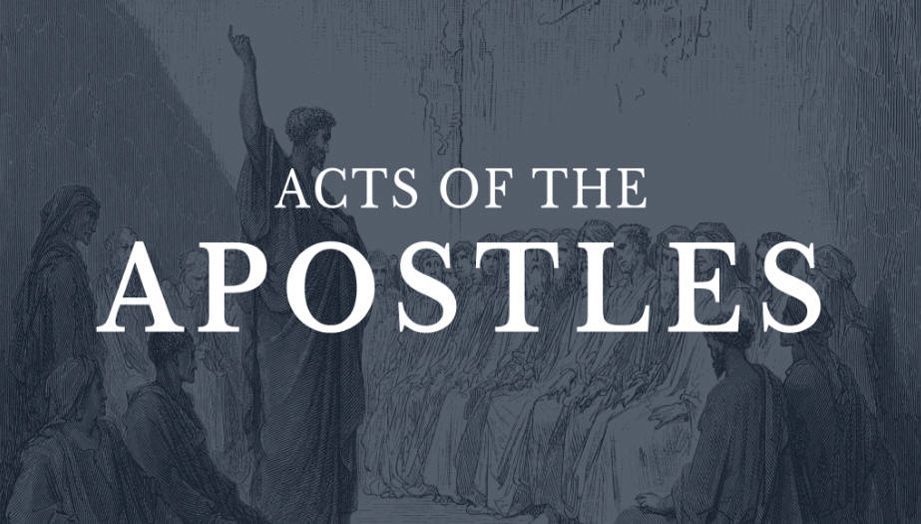
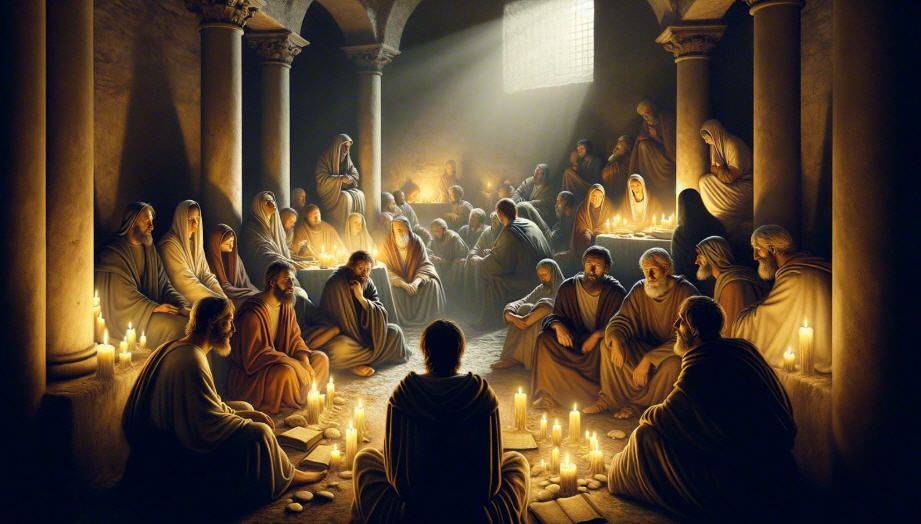
CATHOLIC TRIVIA – JUST FOR FUN
(Click the down arrow for the answer!)
Question: According to the Acts of the Apostles, who was selected to replace the Apostle Judas?
Question: According to the Acts of the Apostles, who was selected to replace the Apostle Judas?
Answer: St. Matthias.
Question: What are the names of the three theological virtues of the Catholic Church?
Question: What are the names of the three theological virtues of the Catholic Church?
Answer: Faith, Hope, and Love (Charity).
Question: How many votes are needed in a papal conclave to elect a new pope?
Question: How many votes are needed in a papal conclave to elect a new pope?
Answer: A two-thirds majority.
Question: Who were the very first people to visit Jesus after he was born?
Question: Who were the very first people to visit Jesus after he was born?
Answer: Two local shepherds who were told about Jesus by an angel.
The Stations of the Cross
The Christian loves to follow the Way of the Cross in the Savior's footsteps. The Stations, from the Prætorium to Golgotha and the tomb, trace the passion and death of Christ, who by his holy cross has redeemed the world. To understand the mystery of Redemption and the salvific meaning of suffering, one ought to meditate upon the sufferings of our Lord, which he took upon himself to save us from sin. God is always with those who suffer. His omnipotence is manifested precisely in the fact that he freely accepted suffering. He could have chosen not to do so. He could have chosen to demonstrate his omnipotence even at the moment of the Crucifixion.7
In the name of the Father, and of the Son,
and of the Holy Spirit. Amen.
My Lord and my God,
under the loving eyes of our Mother,
we are making ready to accompany You
along this path of sorrow,
which was the price paid for our redemption.
We wish to suffer all that You suffered,
to offer You our poor, contrite hearts,
because You are innocent, and yet
You are going to die for us,
who are the only really guilty ones.
My mother, Virgin of sorrows,
help us to relive those bitter hours,
which your Son wished to spend on earth,
so that we, who were made from a handful of clay,
may finally live
in the freedom and glory of the children of God.
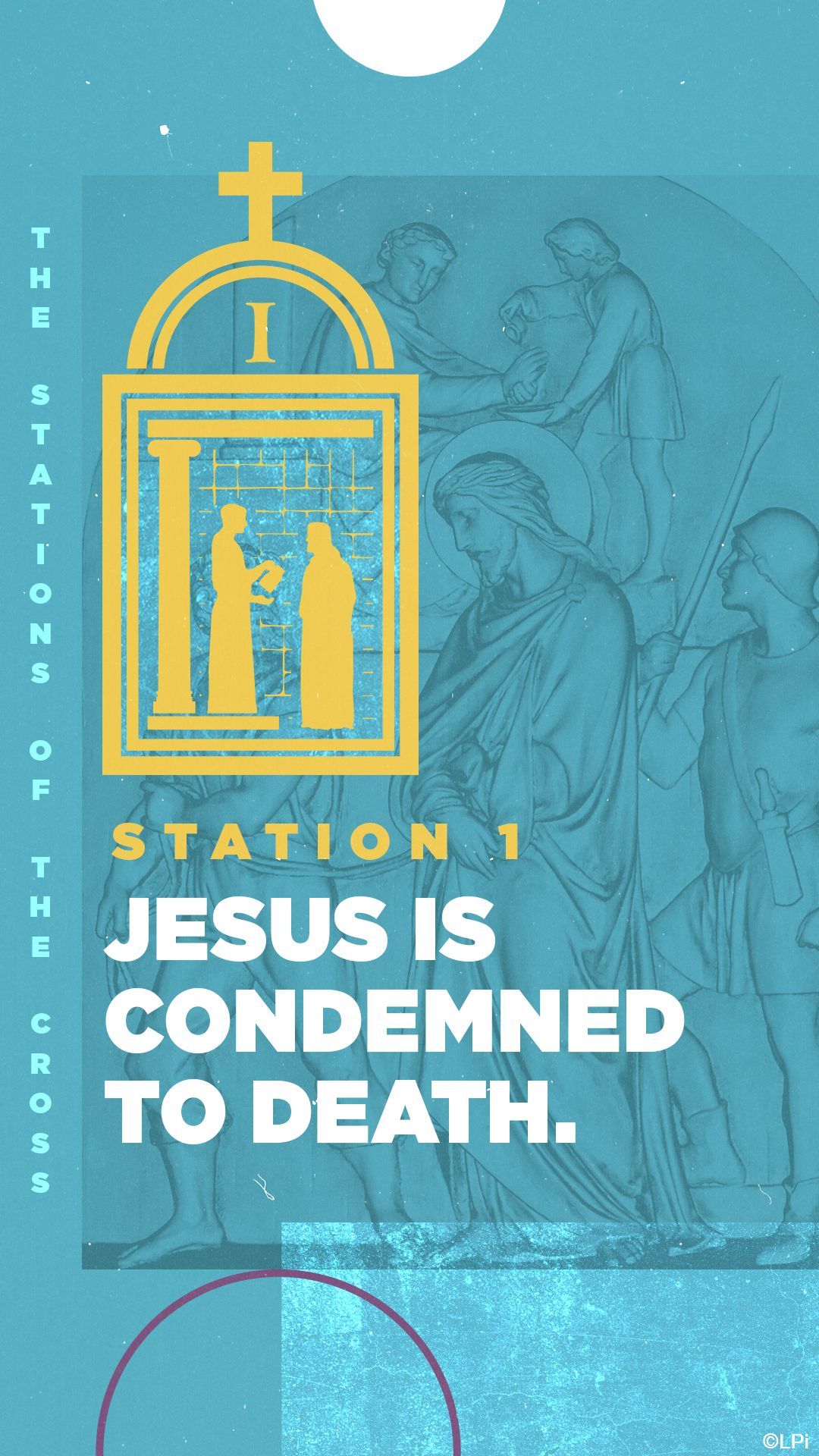
FIRST STATION
JESUS IS CONDEMNED TO DEATH
V. We adore you, O Christ, and we bless you.
R. Because, by your holy cross, you have redeemed the world.
It is after ten in the morning. The trial is moving to its close. There has been no conclusive evidence. The judge knows that his enemies have handed Jesus over to him out of envy, and he tries an absurd move: a choice between Barabbas, a criminal accused of robbery and murder, and Jesus, who says he is Christ. The people choose Barrabas, and Pilate exclaims: What am I to do, then, with Jesus? (Mt 27:22).
They all reply: Crucify him! The judge insists: Why, what evil has he done? Once again they respond, shouting: Crucify him! Crucify him!
Pilate is frightened by the growing uproar. So he sends for water and washes his hands in the sight of the people, saying as he does so: I am innocent of the blood of this just man; it is your affair (Mt 27:24).
And having had Jesus scourged, he hands him over to them to be crucified. Their frenzied and possessed throats fall silent, as if God had already been vanquished.
* Jesus is all alone. Far off now are the days when the words of the Man-God brought light and hope to men's hearts, those long processions of sick people whom he healed, the triumphant acclaim of Jerusalem when the Lord arrived, riding on a gentle donkey. If only men had wanted to give a different outlet for God's love! If only you and I had recognized the day of the Lord!
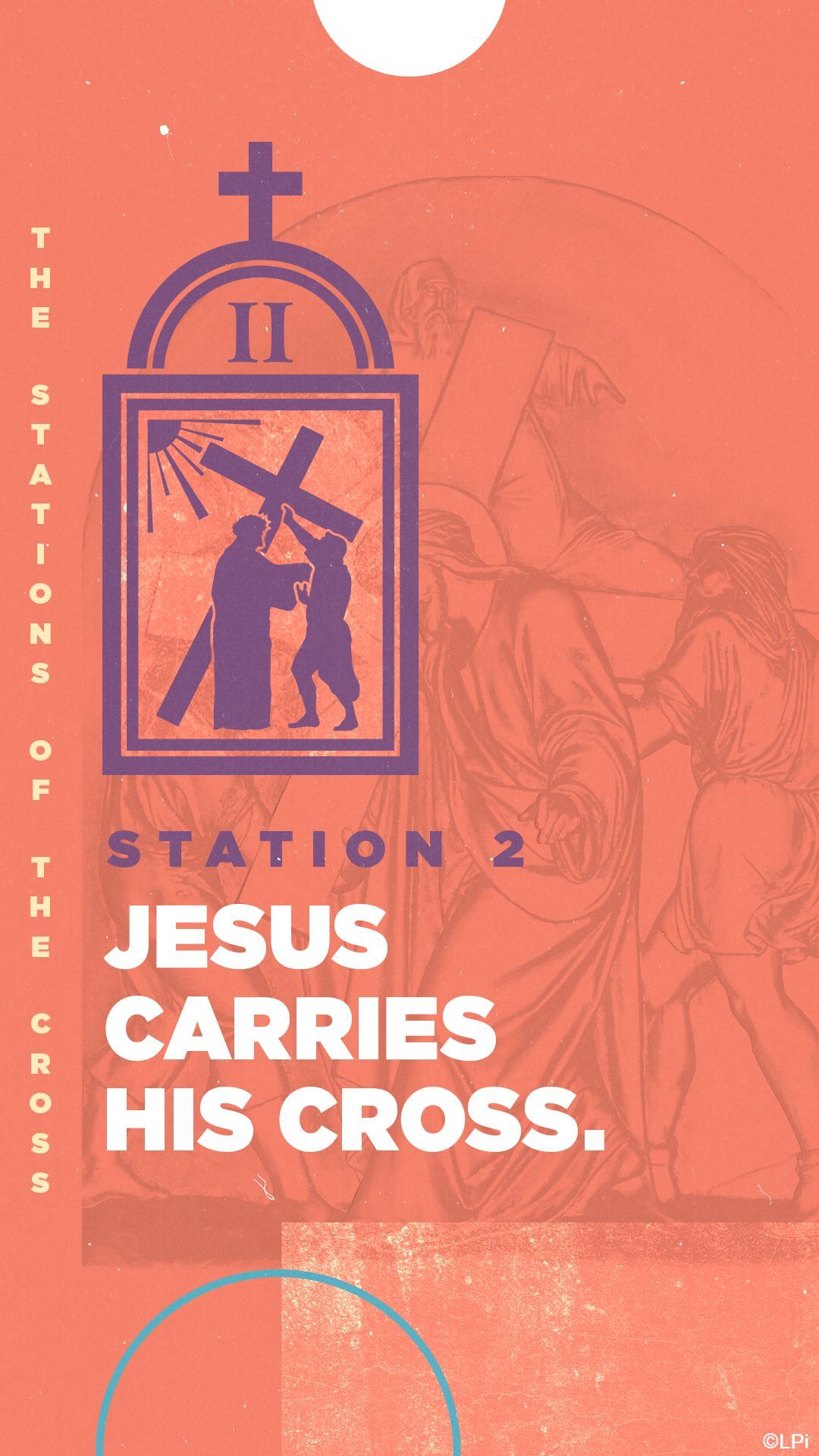
SECOND STATION
JESUS TAKES UP HIS CROSS
V. We adore you, O Christ, and we bless you.
R. Because, by your holy cross, you have redeemed the world.
Outside the city, to the northwest of Jerusalem, there is a little hill: Golgotha is its name in Aramaic; locus Calvariæ, in Latin: the place of skulls, or Calvary.
Offering no resistance, Jesus gives himself up to the execution of the sentence. He is to be spared nothing, and upon his shoulders falls the weight of the ignominious cross. But, through love, the cross is to become the throne from which he reigns.
The people of Jerusalem and those from abroad who have come for the Passover push their way through the city streets, to catch a passing glimpse of Jesus of Nazareth, the King of the Jews. There is a tumult of voices, and, now and then, short silences-perhaps when Jesus fixes his eyes on someone:
If anyone wishes to come after me, let him take up his cross daily and follow me (Mt 16:24).
How lovingly Jesus embraces the wood which is to bring him to death!
* Is it not true that as soon as you cease to be afraid of the cross, of what people call the cross, when you set your will to accept the will of God, then you find happiness, and all your worries, all your sufferings, physical or moral, pass away?
Truly the cross of Jesus is gentle and lovable. There, sorrows cease to count; there is only the joy of knowing that we are co-redeemers with him.
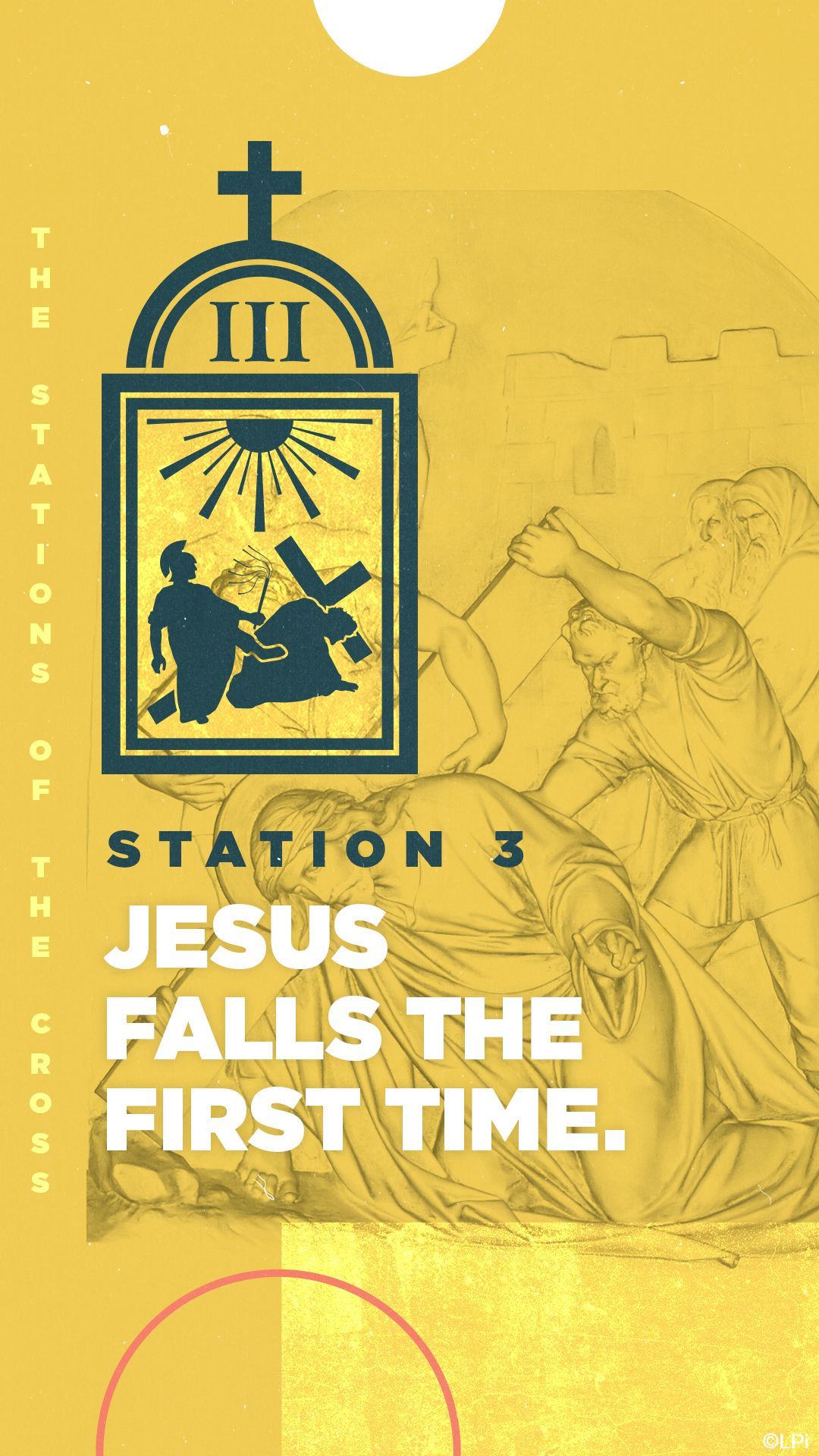
THIRD STATION
JESUS FALLS THE FIRST TIME
V. We adore you, O Christ, and we bless you.
R. Because, by your holy cross, you have redeemed the world.
The heavy cross cuts and tears into our Lord's shoulders.
The crowd has swollen into a multitude, and the legionaries can scarcely contain the angry, surging mob which, like a river that has burst its banks, flows through the streets and alleyways of Jerusalem.
The worn-out body of Jesus staggers now beneath the huge cross. His most loving heart can barely summon up another breath of life for his poor wounded limbs.
To his right and left, our Lord sees the multitude moving around like sheep without a shepherd. He could call them one by one by their names-by our names. There they are, those who were fed at the multiplication of the loaves and fishes, those who were cured of their ailments, those he taught by the lakeside, on the mountain and in the porticoes of the Temple.
A sharp pain pierces the soul of Jesus; our Lord falls to the ground, exhausted.
* You and I can say nothing: now we know why the cross of Jesus weighs so much. We weep over our wretched failings and also for the terrible ingratitude of the human heart. From the depths of our soul there comes an act of real contrition, which lifts us up from the prostration of sin. Jesus has fallen that we might get up: once and for all.
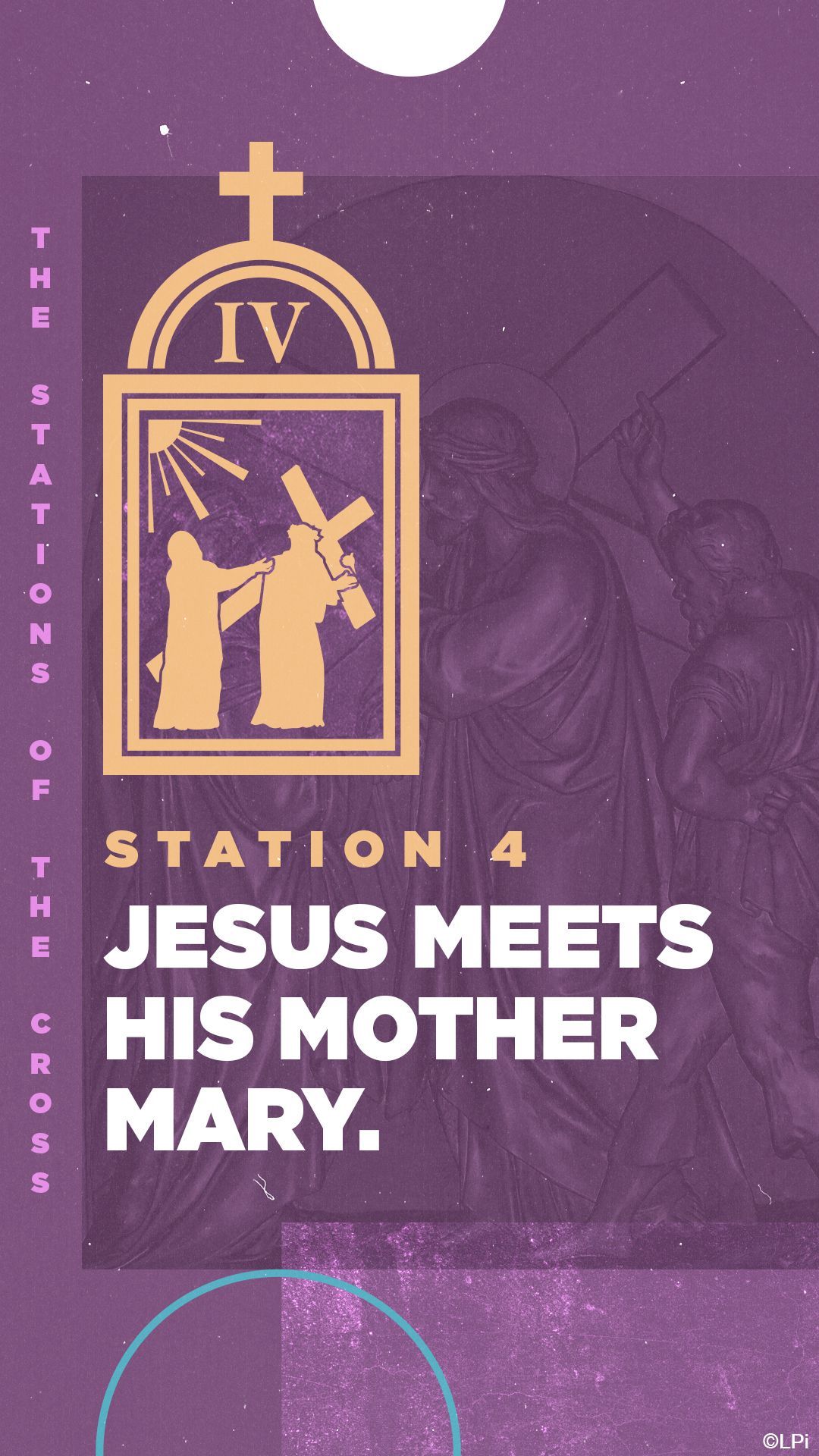
FOURTH STATION
JESUS MEETS HIS BLESSED MOTHER
V. We adore you, O Christ, and we bless you.
R. Because, by your holy cross, you have redeemed the world.
No sooner has Jesus risen from his first fall than he meets his Blessed Mother, standing by the wayside where he is passing.
With immense love Mary looks at Jesus, and Jesus at his mother. Their eyes meet, and each heart pours into the other its own deep sorrow. Mary's soul is steeped in bitter grief, the grief of Jesus Christ.
O all you that pass by the way, look and see, was there ever a sorrow to compare with my sorrow! (Lm 1:12).
But no one notices, no one pays attention; only Jesus.
Simeon's prophecy has been fulfilled: Thine own soul a sword shall pierce (Lk 2:35).
In the dark loneliness of the Passion, our Lady offers her son a comforting balm of tenderness, of union, of faithfulness; a "yes" to the divine will.
* Hand in hand with Mary, you and I also want to console Jesus, by accepting always and in everything the will of his Father, of our Father.
Only thus will we taste the sweetness of Christ's cross and come to embrace it with all the strength of Love, carrying it in triumph along the ways of the earth.
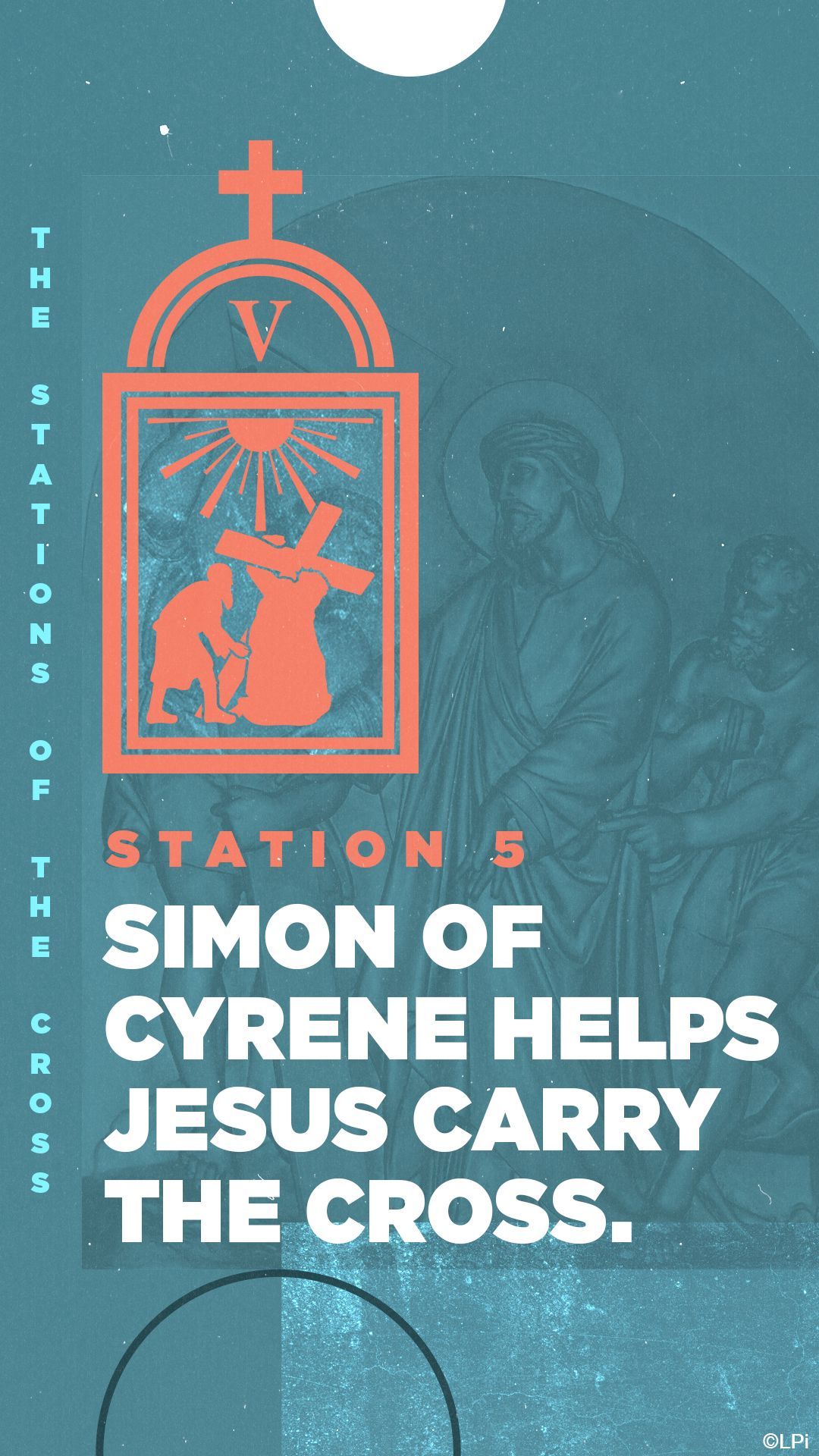
FIFTH STATION
SIMON OF CYRENE HELPS JESUS TO CARRY THE CROSS
V. We adore you, O Christ, and we bless you.
R. Because, by your holy cross, you have redeemed the world.
Jesus is exhausted. His footsteps become more and more unsteady, and the soldiers are in a hurry to be finished. So when they are going out of the city through the Judgment Gate, they take hold of a man who is coming in from a farm, a man called Simon of Cyrene, the father of Alexander and Rufus, and they force him to carry the cross of Jesus (cf. Mk 15:21).
In the whole context of the Passion, this help does not add up to very much. But, for Jesus, a smile, a word, a gesture or a little bit of love is enough for him to pour out his grace bountifully on the soul of his friend. Years later, Simon's sons, Christians by then, will be known and held in high esteem among their brothers in the faith. And it all started with this unexpected meeting with the cross.
I went to those who were not looking for me; I was found by those that sought me not (Is 65:1).
* At times the cross appears without our looking for it: It is Christ who is seeking us out. And if by chance, before this unexpected cross which, perhaps, is therefore more difficult to understand, your heart were to show repugnance . . . don't give it consolations. And, filled with a noble compassion, when it asks for them, say to it slowly, as one speaking in confidence: "Heart: heart on the cross! Heart on the cross!"
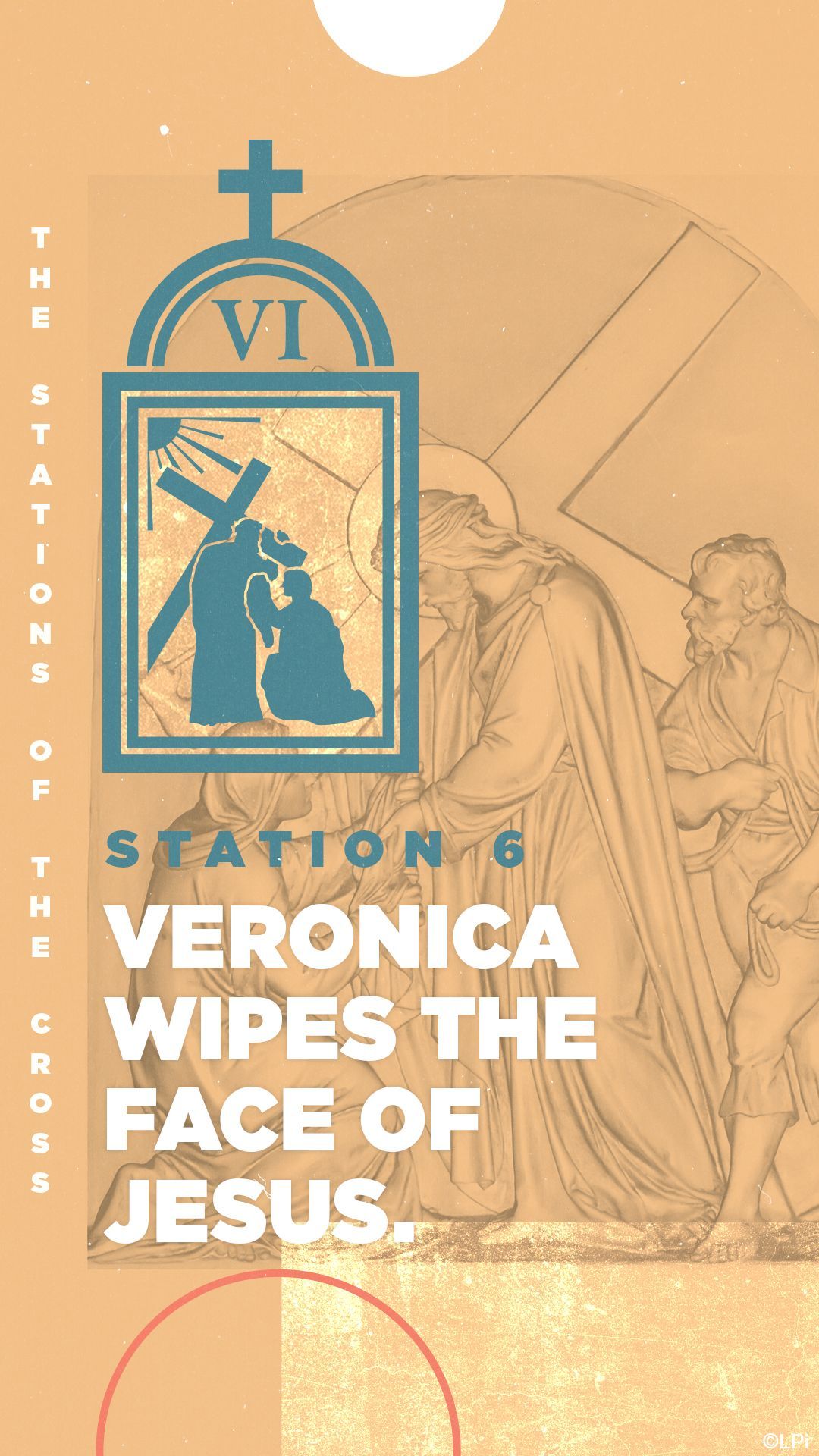
SIXTH STATION
VERONICA WIPES THE FACE OF JESUS
V. We adore you, O Christ, and we bless you.
R. Because, by your holy cross, you have redeemed the world.
Jesus, suddenly a woman comes out of the crowd. Her name is Veronica. You can see how she cares for you as she takes a cloth and begins to wipe the blood and sweat from your face. She can't do much, but she offers what little help she can.
As a child, sometimes I know someone could use a little help and understanding. They may be picked on or teased by others, or just sad or lonely. Sometimes I feel bad that others don't step in to help, but I don't help either.
As an adult, I notice the needs around me. Sometimes my own family members crave my attention, and I don't even seem to notice. Sometimes a co-worker, friend, or family member could use help or understanding, but I don't reach out to help lest I be criticized, or that they demand more of me than I'd like to give.
My tender Jesus, Who didst deign to print Thy sacred face upon the cloth with which Veronica wiped the sweat from off Thy brow, print in my soul deep, I pray Thee, the lasting memory of Thy bitter pains.
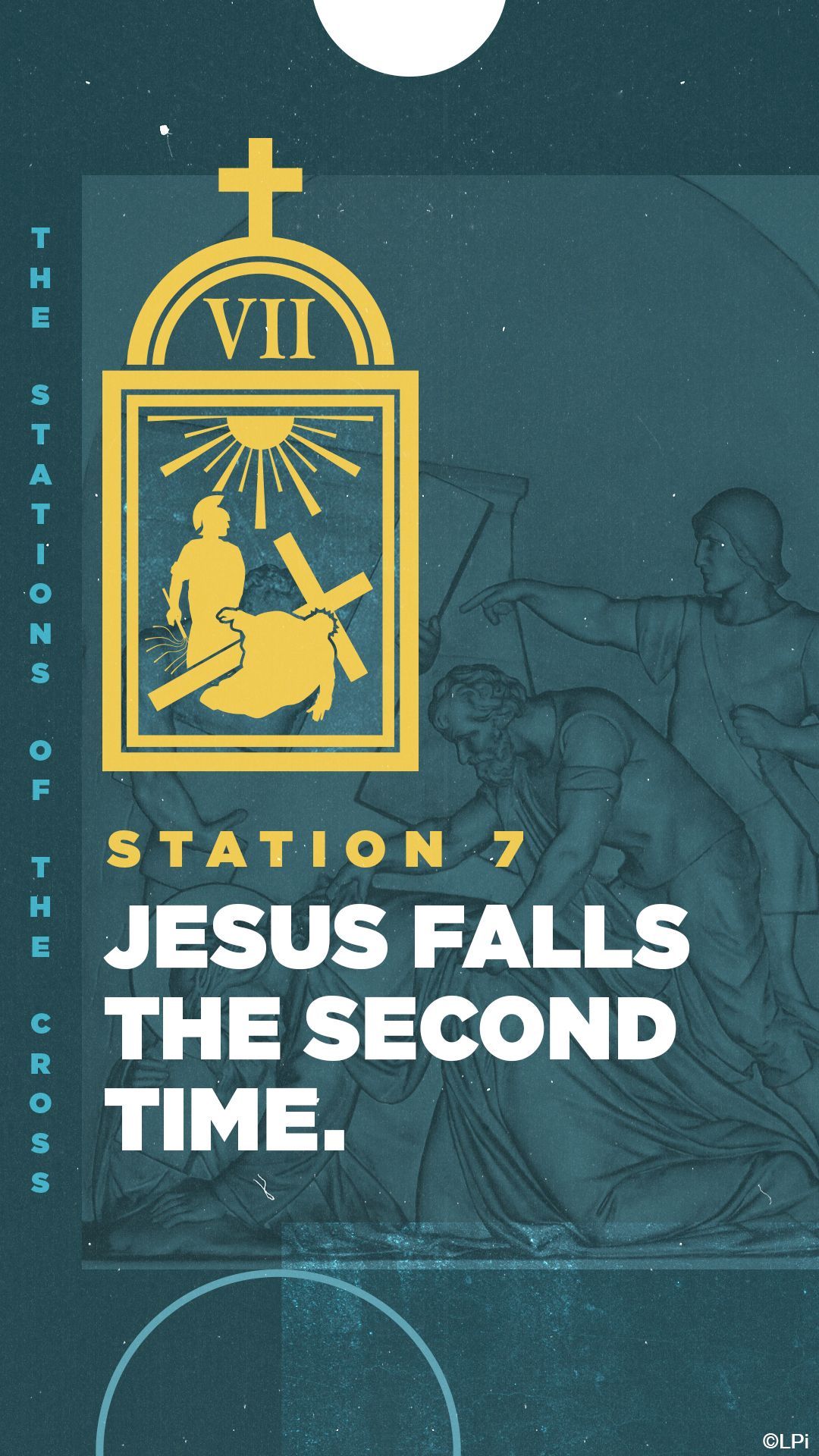
SEVENTH STATION
JESUS FALLS A SECOND TIME
V. We adore you, O Christ, and we bless you.
R. Because, by your holy cross, you have redeemed the world.
Outside the walls of the city, the body of Jesus again gives way through weakness, and he falls a second time, amid the shouts of the crowd and the rough handling of the soldiers.
Infirmity of body and bitterness of soul have caused Jesus to fall again. All the sins of men-mine too-weigh down on his Sacred Humanity.
He has borne our infirmities and carried our sorrows, and we have taken him for a leper, and as one struck by God and afflicted. But he was wounded for our iniquities and bruised for our sins. On him fell the punishment that brought us salvation, and by his wounds we have been healed (Is 53:4-5).
Jesus stumbles, but his fall lifts us up; his death brings us back to life.
To our falling again and again into evil, Jesus responds with his determination to redeem us, with an abundance of forgiveness. And, so that no one may despair, again he wearily raises himself, embracing the cross.
* May our stumbles and defeats separate us from him no more. Just as a feeble child throws himself contritely into the strong arms of his father, you and I will hold tightly to the yoke of Jesus. Only a contrition and humility like this can transform our human weakness into the fortitude of God.
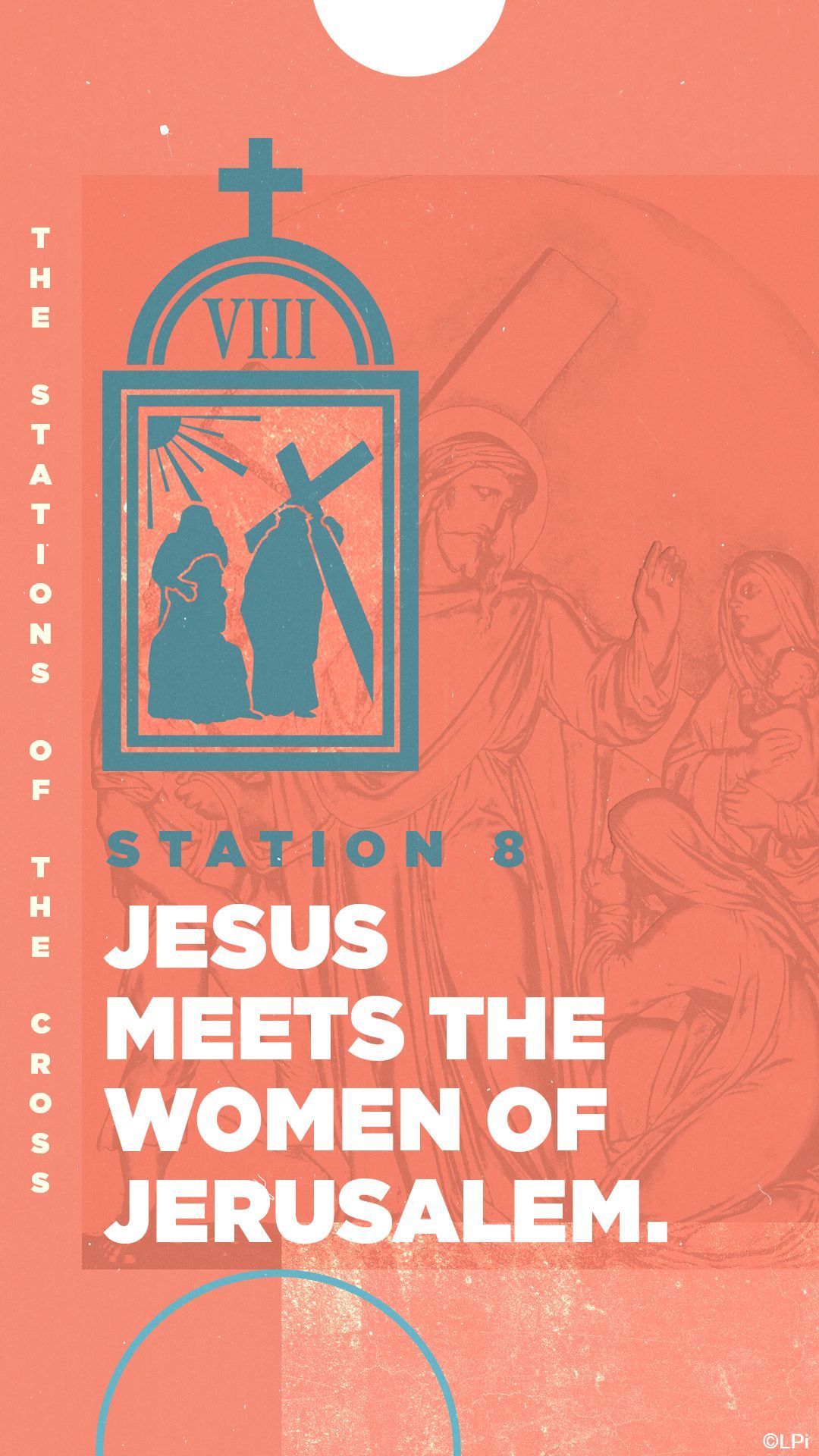
EIGHTH STATION
JESUS CONSOLES THE WOMEN OF JERUSALEM
V. We adore you, O Christ, and we bless you.
R. Because, by your holy cross, you have redeemed the world.
Among the people watching our Lord as he passes by are a number of women who, unable to restrain their compassion, break into tears, perhaps recalling those glorious days spent with Jesus, when everyone exclaimed in amazement: Bene omnia fecit (Mk 7:37). He has done all things well.
But our Lord wishes to channel their weeping towards a more supernatural motive. He invites them to weep for sins, which are the cause of the Passion and which will draw down the rigor of divine justice:
Daughters of Jerusalem, weep not for me, but for yourselves and for your children. . . . For if they do these things to the green wood, what shall be done to the dry? (Lk 23:28, 31).
* Your sins, my sins, the sins of all men, rise up. All the evil we have done and the good that we have neglected to do. The desolate panorama of the countless crimes and iniquities which we would have committed, if he, Jesus, had not strengthened us with the light of his most loving glance.
How little a life is for making atonement!
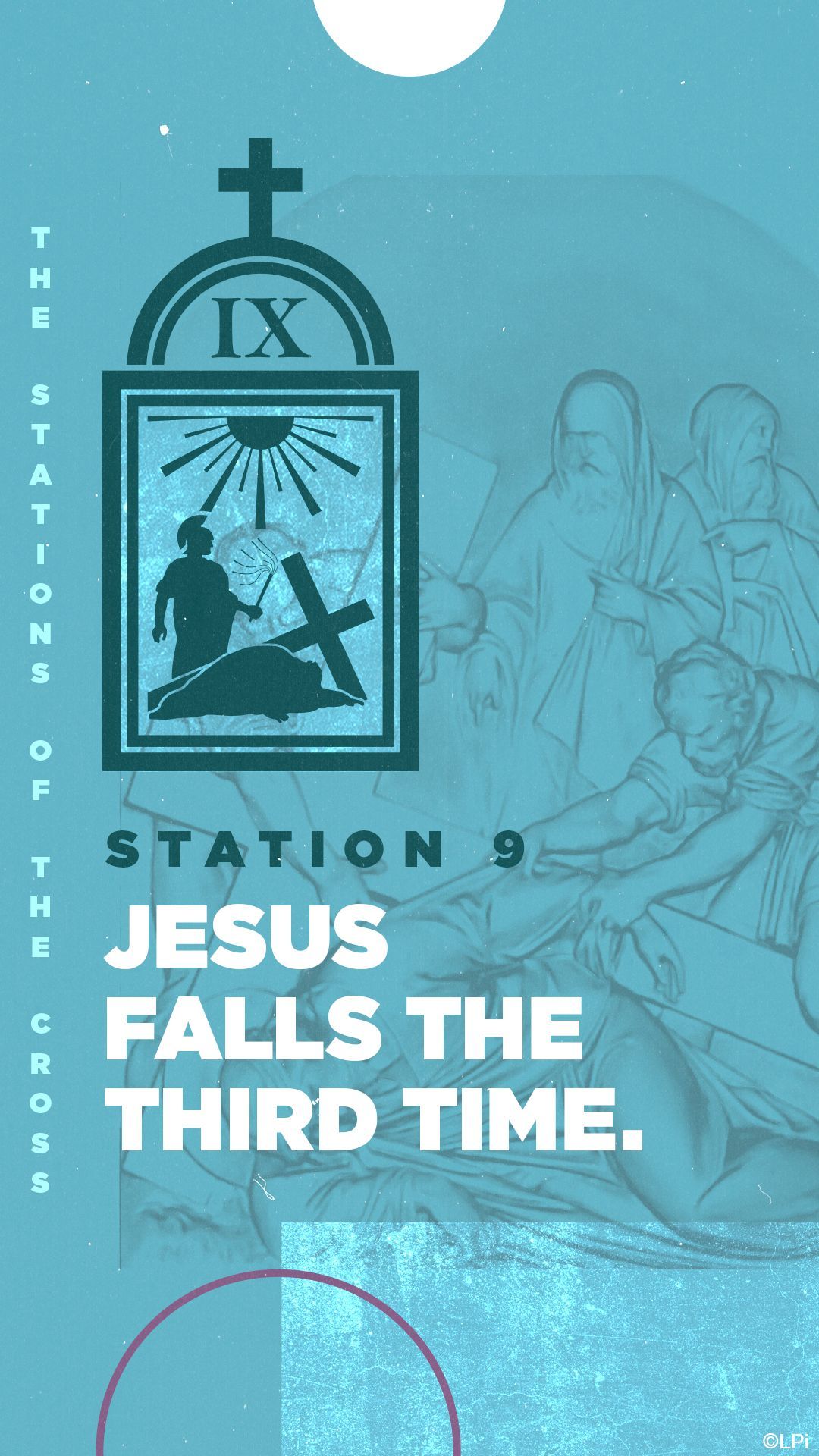
NINTH STATION
JESUS FALLS THE THIRD TIME
V. We adore you, O Christ, and we bless you.
R. Because, by your holy cross, you have redeemed the world.
Our Lord falls for the third time, on the slope leading up to Calvary, with only forty or fifty paces between him and the summit. Jesus can no longer stay on his feet: his strength has failed him, and he lies on the ground in utter exhaustion.
He offered himself up because it was his will; abused and ill-treated, he opened not his mouth, as a sheep led to the slaughter, dumb as a lamb before its shearers (Is 53:7).
Everyone against him . . . the people of the city and those from abroad, and the Pharisees and the soldiers and the chief priests. . . . All of them executioners. His mother-my mother-weeps.
Jesus fulfills the will of his Father! Poor; naked. Generous: what is there left for him to surrender? Dilexit me, et tradidit semetipsum pro me (Gal 2:20), he loved me and delivered himself up unto death for me.
* My God! May I hate sin and unite myself to you, taking the holy cross into my arms, so that I, in my turn, may fulfill your most lovable will, . . . stripped of every earthly attachment, with no other goal but your glory, . . . generously, not keeping anything back, offering myself with you in a perfect holocaust.
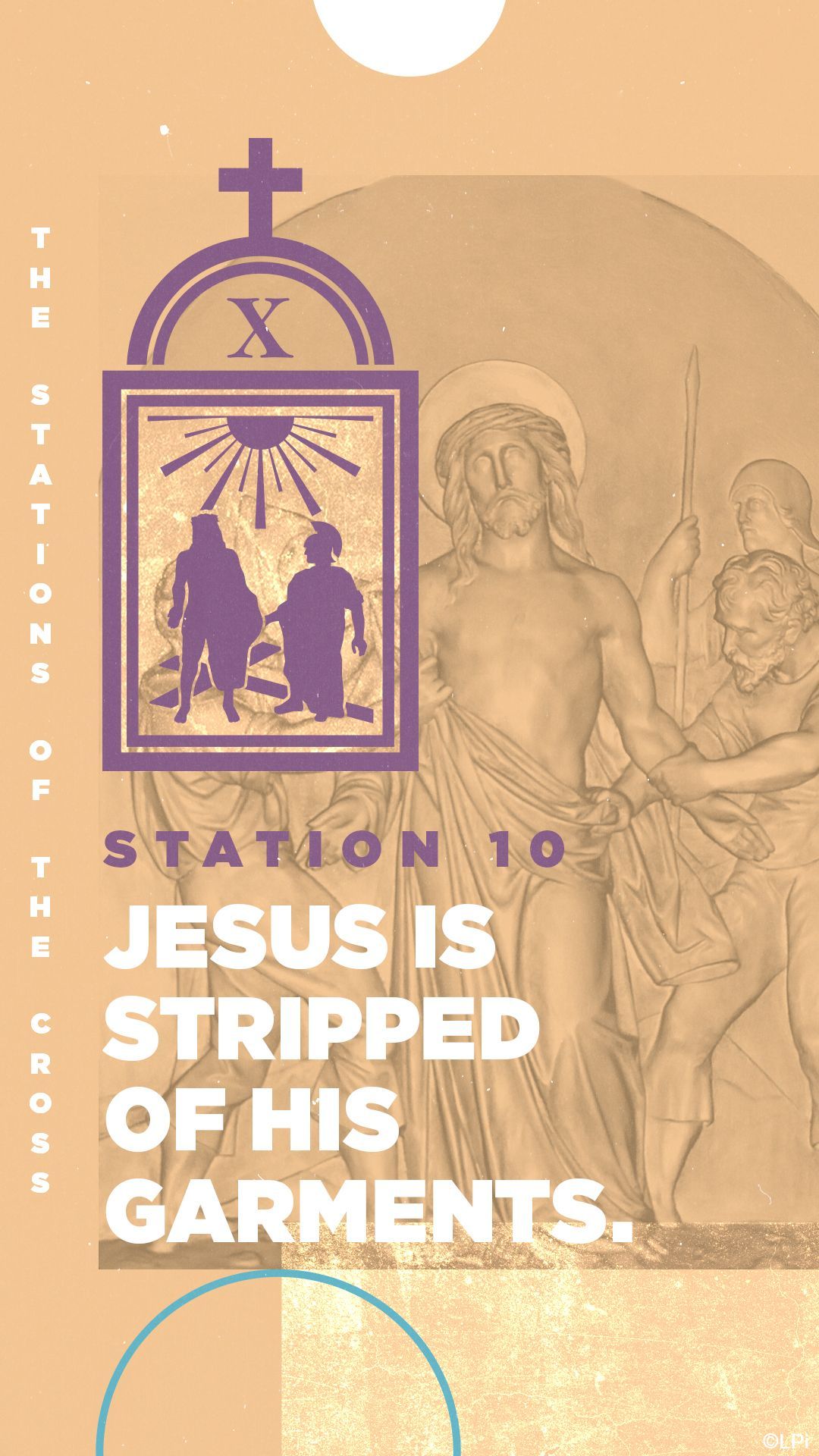
TENTH STATION
JESUS IS STRIPPED OF HIS GARMENTS
V. We adore you, O Christ, and we bless you.
R. Because, by your holy cross, you have redeemed the world.
When our Lord arrives at Calvary, he is given some wine to drink mixed with gall, as a narcotic to lessen in some way the pain of the crucifixion. But Jesus, after tasting it to show his gratitude for that kind service, he has not wanted to drink (cf. Mt 27:34). He gives himself up to death with the full freedom of love.
Then the soldiers strip Christ of his garments.
From the soles of his feet to the top of his head, there is nothing healthy in him: wounds and bruises and swelling sores. They are not bound up, nor dressed, nor anointed with oil (Is 1:6).
The executioners take his garments and divide them into four parts. But the cloak is without seam, so they say:
It would be better not to tear it, but let us cast lots for it to see whose it shall be (Jn 19:24).
Thus, Scripture is again fulfilled: They divided my garments among them, and upon my vesture they cast lots (Ps 21:19).
* Despoiled, stripped, left in the most absolute poverty, our Lord is left with nothing, save the wood of the cross.
For us to reach God, Christ is the way; but Christ is on the cross, and to climb up to the cross we must have our heart free, not tied to earthly things.
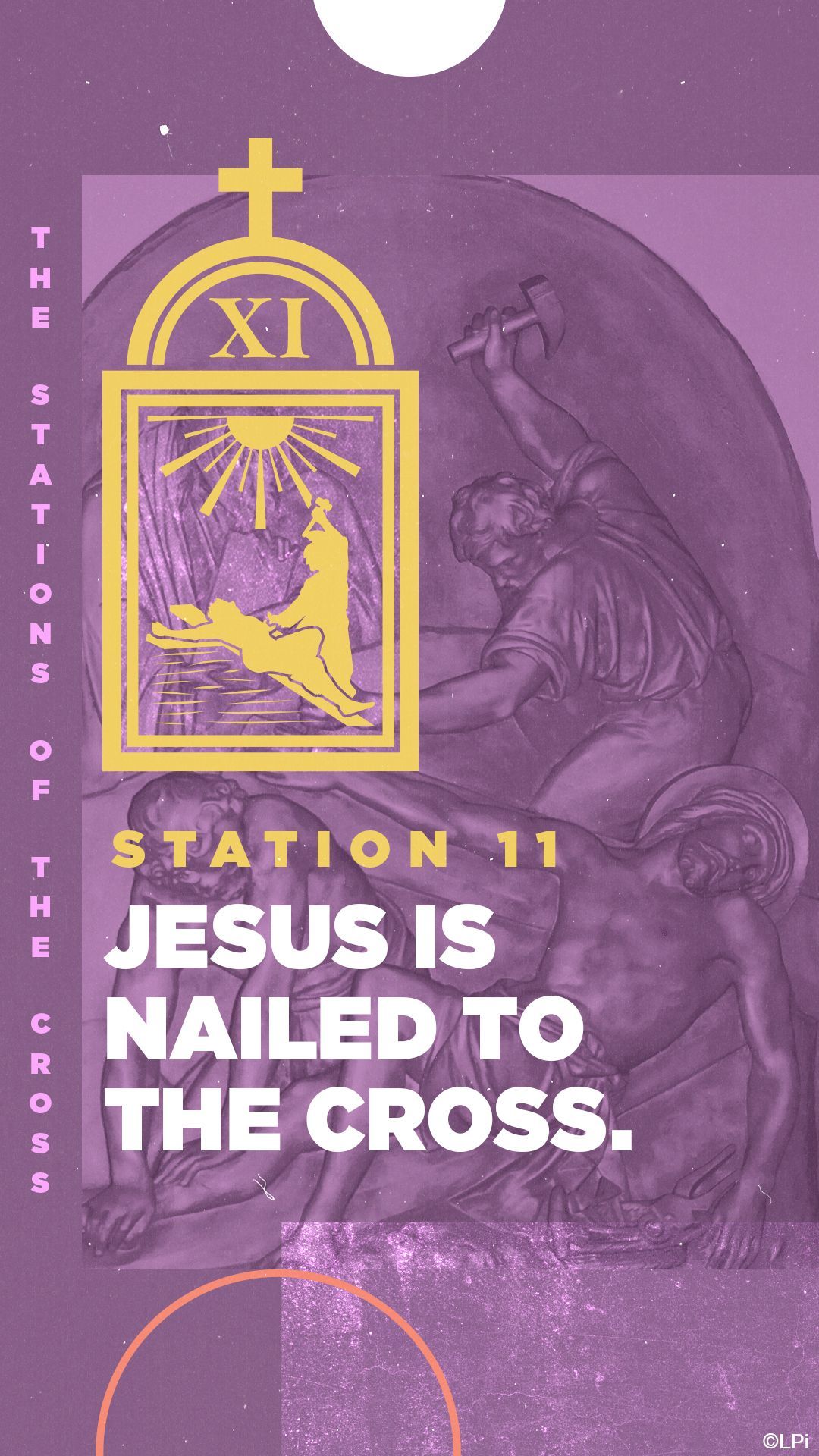
ELEVENTH STATION
JESUS IS NAILED TO THE CROSS
V. We adore you, O Christ, and we bless you.
R. Because, by your holy cross, you have redeemed the world.
You are stretched out on the cross you have carried so far. The soldiers take big nails and drive them into your hands and feet. You feel abandoned by the people you loved so much. People seem to have gone mad. You have done nothing but good, yet they drive nails through your hands and feet.
As a child, sometimes I hurt others. Sometimes I join with friends and decide not to like another. We gang up against another and cause them hurt and pain. Sometimes I say or do hurtful things to my brothers and sisters. I can wonder what they'd think about themselves if they believed everything I told them about themselves.
As and adult, sometimes I discriminate against others. Even without thinking, I judge others because of their color, intelligence, income level or name. I forget that I am to live as a brother or sister to all people. Sometimes I use harsh words when I speak to my children and family members. I can find it easy to look for something that isn't very important and make it very important.
Help me look again at the people around me. Help me see the hurt and pain I have caused in others. Be with me to help me make amends for the harm I have done.
My Jesus, by Thine agony when the cruel nails pierced Thy tender hands and feet and fixed them to the cross, make me crucify my flesh by Christian penance.
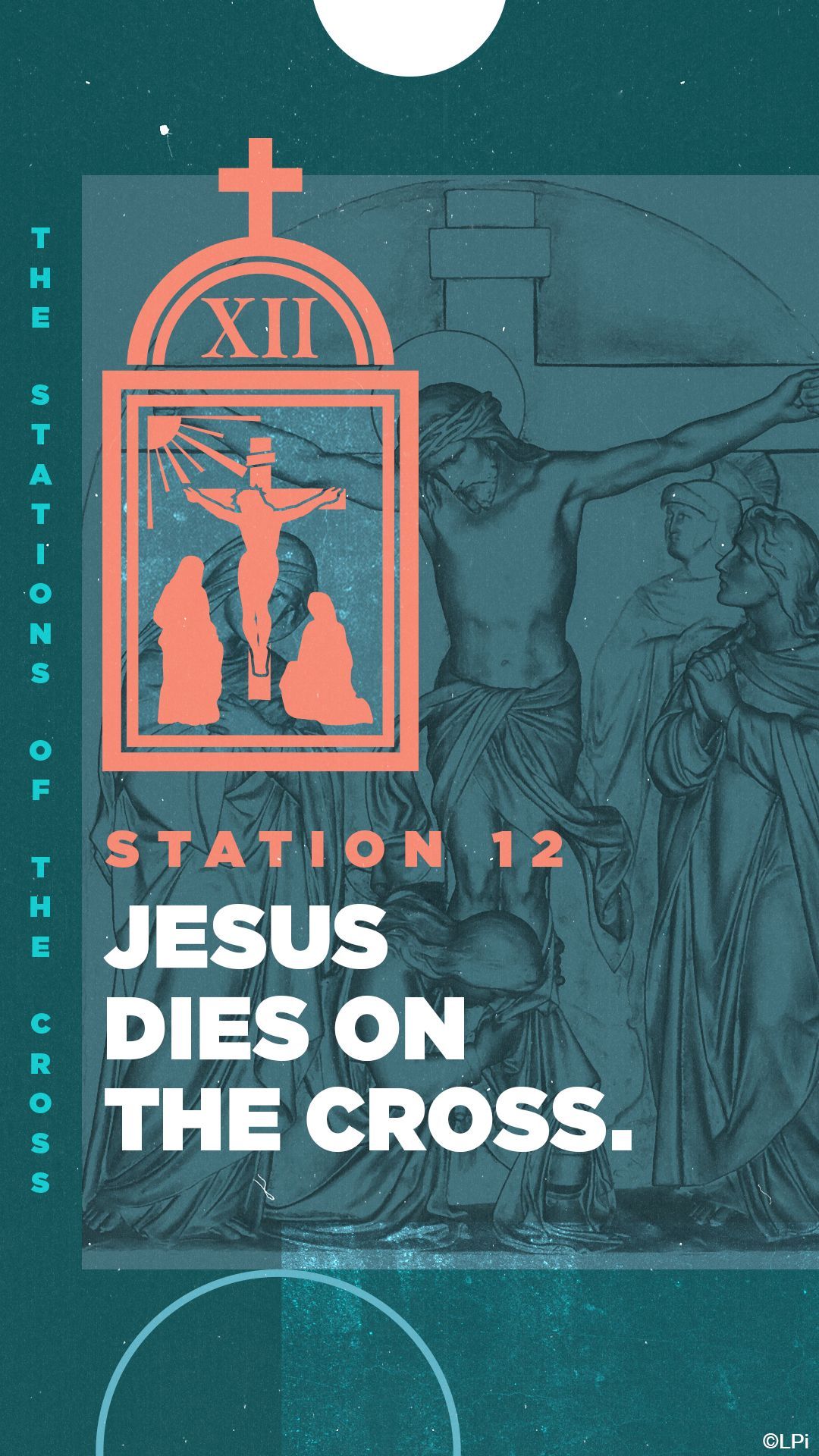
TWELFTH STATION
JESUS DIES ON THE CROSS
V. We adore you, O Christ, and we bless you.
R. Because, by your holy cross, you have redeemed the world.
On the uppermost part of the cross, the reason for the sentence is written: Jesus of Nazareth, King of the Jews (Jn 19:19). And all who pass by insult him and jeer at him. If he is the king of Israel, let him come down here and now from the cross (Mt 27:42).
One of the thieves comes to his defense: This man has done no evil . . . (Lk 23:41). Then, turning to Jesus, he makes a humble request, full of faith: Lord, remember me when thou comest into thy kingdom (Lk 23:42).
Truly, I say to thee: This day thou shalt be with me in Paradise (Lk 23:43).
At the foot of the cross stands his mother, Mary, with other holy women. Jesus looks at her; then he looks at the disciple whom he loves, and he says to his mother: Woman, behold thy son. Then he says to the disciple: Behold thy mother (Jn 19:26-27).
The sun's light is extinguished, and the earth is left in darkness. It is close to three o'clock, when Jesus cries out: Eli, Eli, lamma sabacthani? That is: My God, my God, why hast thou forsaken me? (Mt 27:46).
Then, knowing that all things are about to be accomplished, that the scriptures may be fulfilled, he says: I am thirsty (Jn 19:28).
The soldiers soak a sponge in vinegar and, placing it on a reed of hyssop, put it to his mouth. Jesus sips the vinegar, and exclaims: It is accomplished!
The veil of the temple is rent, and the earth trembles, when the Lord cries out in a loud voice: Father, into thy hands I commend my spirit. And he expires.
* Love sacrifice; it is a fountain of interior life. Love the cross, which is an altar of sacrifice. Love pain, until you drink, as Christ did, the very dregs of the chalice.
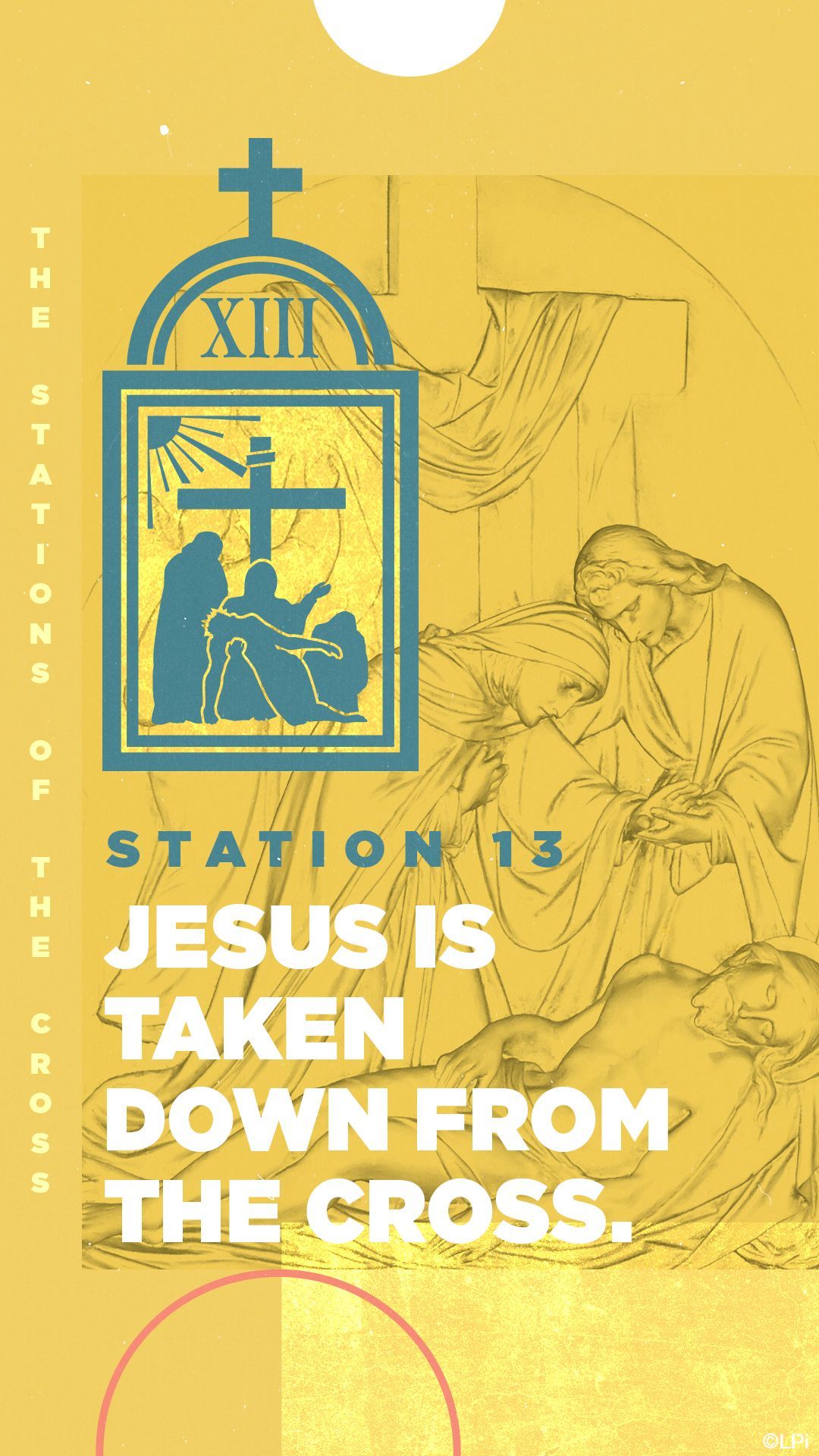
THIRTEENTH STATION
JESUS IS TAKEN DOWN FROM THE CROSS
V. We adore you, O Christ, and we bless you.
R. Because, by your holy cross, you have redeemed the world.
Jesus, how brutally you were put to death. How gently your are taken from the cross. Your suffering and pain are ended, and you are put in the lap of your mother. The dirt and blood are wiped away. You are treated with love.
As a child, sometimes I treat others better when they're sad or in pain. When somebody dies, I become very gentle and kind. I notice the good and kind things people say about those who have died.
As an adult, I seem to be kinder when someone dies. If only I could learn to see the good things about them while they were alive. If only I would tell those around me how much I love them, while I still have the opportunity to do so.
Help me look for the good in those around me, especially those I love the most. Help me live this day as if it were the last. Help me become a more gentle and loving person through my greater appreciation for those around me.
O Mary, Mother most sorrowful, the sword of grief pierced thy soul when thou didst see Jesus lying lifeless on thy bosom; obtain for me hatred of sin because sin slew thy Son and wounded thine own heart, and grace to live a Christian life and save my soul.
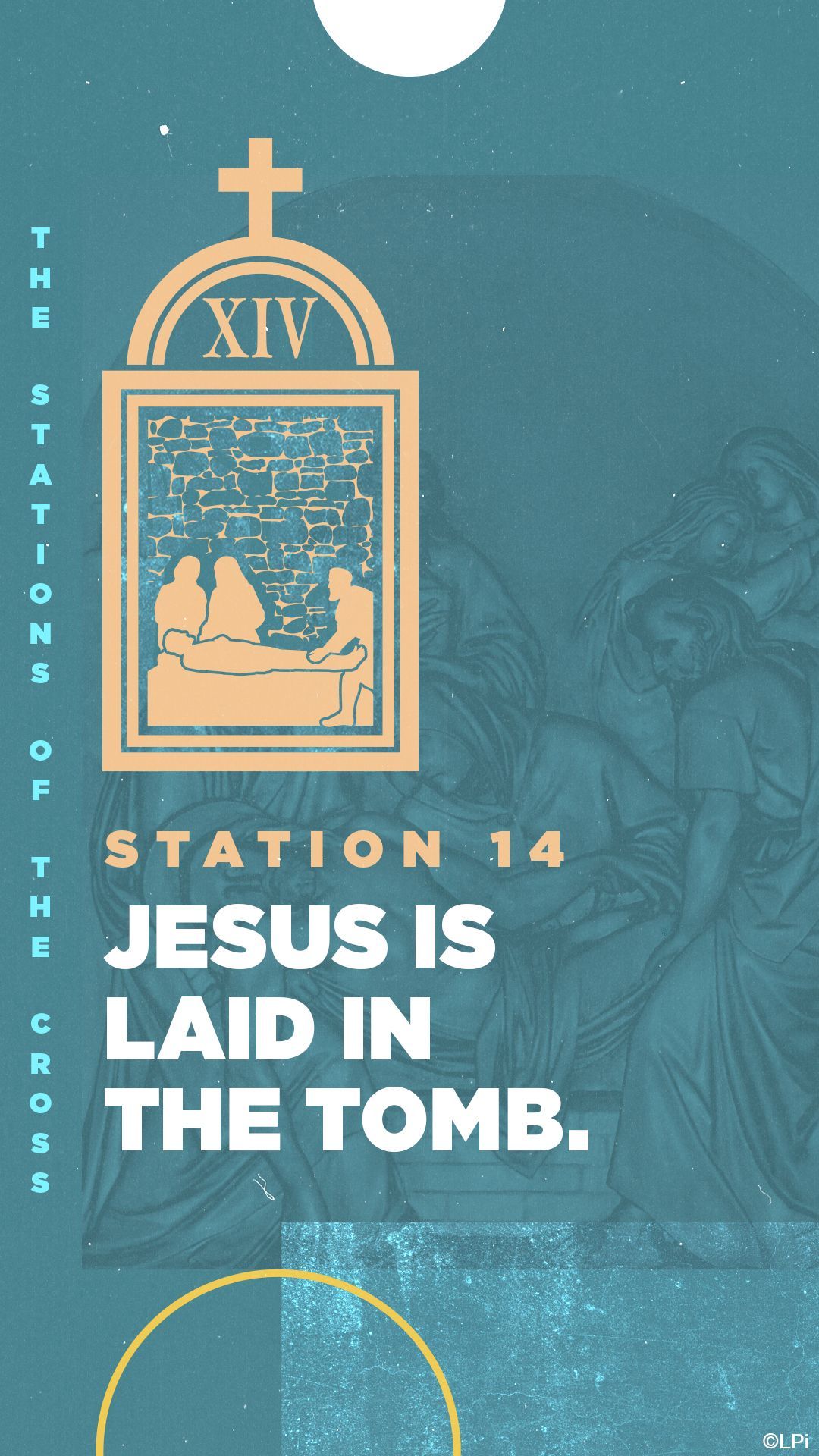
FOURTEENTH STATION
JESUS IS LAID IN THE TOMB
V. We adore you, O Christ, and we bless you.
R. Because, by your holy cross, you have redeemed the world.
Jesus, your body is prepared for burial. Joseph gave you his own tomb. He laid your body there and rolled a large stone in front of it, then went home. What a sad day it has been for so many people.
As a child, sometimes I try to keep everything for myself. I find it hard to share my things with my brothers or sisters and with my friends.
As an adult, I can be selfish too. I can accumulate things and keep them for myself. I try to make sure I have what I want before I share what I have with anybody else.
Help me think of Joseph of Arimathea, who risked his own life as he accepted Jesus' body for burial. Help me think of how Joseph loved Jesus so much that he gave him his own tomb.
My Jesus, beside Thy body in the tomb I, too, would lie dead; but if I live, let it be for Thee, so as one day to enjoy with Thee in heaven the fruits of Thy passion and Thy bitter death.


